
a treasure-trove of literature
treasure found hidden with no evidence of ownership
(and our other authors) or get HELP Reading, Downloading and Converting files)
or
SEARCH the entire site with Google Site Search
 |
Project Gutenberg
Australia a treasure-trove of literature treasure found hidden with no evidence of ownership |
BROWSE the site for other works by this author (and our other authors) or get HELP Reading, Downloading and Converting files) or SEARCH the entire site with Google Site Search |
Title: He, She & They Author: Albert Lee * A Project Gutenberg of Australia eBook * eBook No.: 1600991h.html Language: English Date first posted: October 2016 Most recent update: October 2016 This eBook was produced by: Walter Moore Project Gutenberg of Australia eBooks are created from printed editions which are in the public domain in Australia, unless a copyright notice is included. We do NOT keep any eBooks in compliance with a particular paper edition. Copyright laws are changing all over the world. Be sure to check the copyright laws for your country before downloading or redistributing this file. This eBook is made available at no cost and with almost no restrictions whatsoever. You may copy it, give it away or re-use it under the terms of the Project Gutenberg Australia Licence which may be viewed online.
GO TO Project Gutenberg Australia HOME PAGE


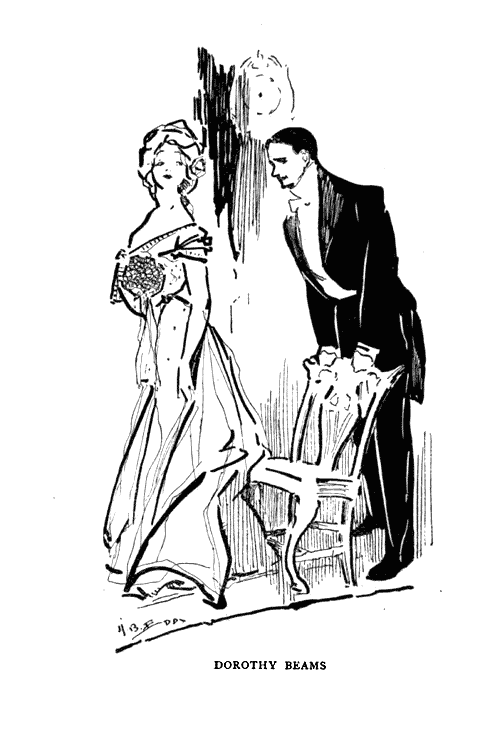
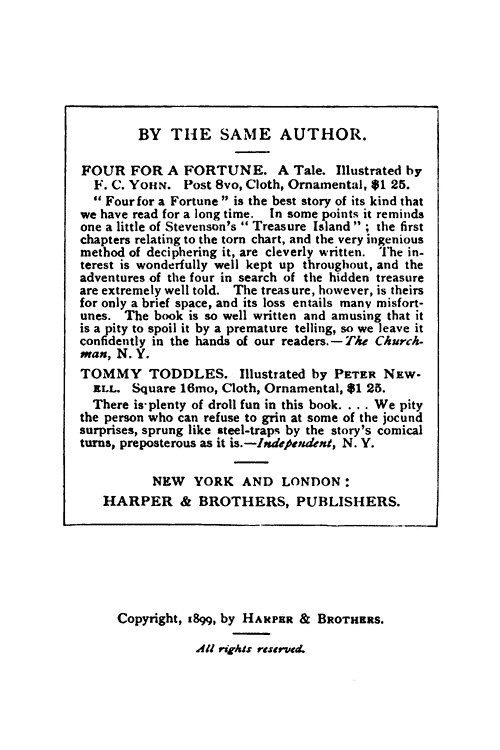
Originally serialized in Harper’s New Monthly Magazine beginning November 1897.
Chapter I
Chapter II
Chapter III
Chapter IV
Chapter V
Chapter VI
Chapter VII
Chapter VIII
Chapter IX
Chapter X
They always dine promptly at seven at the Bentons’—or, rather, as Benton puts it, they are pretty certain to dine promptly according to at least one of the five clocks that tick in the immediate neighborhood of the dining-room, because there is a difference of about half an hour between the time shown by the fastest and that marked by the slowest one. So it is merely a question of knowing which clock to look at when wondering why dinner is not announced.
This is an excellent plan, and should be recommended to one’s enemies, for there certainly is some satisfaction in having at least one time-piece in the house that will strike seven as you unfold your napkin. Then, if Benton has been grumbling, his wife looks up archly as she hears the hour strike; or, if he has been obtrusive in his remarks, she says, sweetly: “Your watch must be a little fast this evening, Arthur dear; the clock is just striking seven.”
The clock, indeed! Benton says he hasn’t discovered yet which particular one of the five is entitled to that distinction; he thinks that perhaps this honor varies, but he has long since given up all attempts to keep them running along at the same pace. He has come to the conclusion that he cannot be a clock-maker, a picture-hanger, a furniture-mover, a carpet-layer, a brass-polisher, and various other things, and properly attend to the various requirements of his own profession besides. This is trite. Benton admits that. But he enjoys the satisfaction of saying it himself. It is a very simple matter, apparently, to put up curtain-poles; but if you smash your finger with a hammer, so as to incapacitate it from holding a pen for several days thereafter, and if you make your living by your pen—as Benton tries to do—it is cheaper in the end to pay an exorbitant price to a rough fellow with soiled boots to come into your parlor and put up the poles. Everybody knows this; but everybody’s wife does not. Benton’s wife did not—until one day she begged him, with tears in her eyes, to come down off the stepladder and cease blaspheming. That was the end of Benton’s career as Jack-of-all-trades. Previous to this, he used to be sent up on a stepladder every Sunday, and on all legal holidays. But as soon as he became profane about it, his wife consented that he should resign, battered and bruised, from the various trades thrust upon him by matrimony; and Benton forthwith vowed he would never again, even secretly, offend the Pole-hangers’ Union, or the Brotherhood of Carpet-Layers, or the Piano-movers’ Association, by performing the work specifically conceded to their respective trades. And since then, Sunday has been for him a day of rest, in fact as well as in fiction.
But this is digressing. It is seven o’clock. Two of the time-pieces have announced the fleeting hour, and the others will surely fleet along with the soup.
 “I have a surprise for you this evening,” says Ethel, as she squeezes a section of lemon over an oyster, and shoots the juice into her husband’s eye. But Benton’s eye is quite accustomed to this. Ethel is his wife, and she is a very superior person. At the dinner-table the two discuss the affairs of state, likewise those of the household, frequently those of their neighbors, and if Benton allowed such a small matter as a drop of lemon-juice to interfere with the flow of conversation, he would justly deserve censure. Therefore, when Ethel announces that she has a surprise, he says, “Indeed?” and blinks rapidly.
“I have a surprise for you this evening,” says Ethel, as she squeezes a section of lemon over an oyster, and shoots the juice into her husband’s eye. But Benton’s eye is quite accustomed to this. Ethel is his wife, and she is a very superior person. At the dinner-table the two discuss the affairs of state, likewise those of the household, frequently those of their neighbors, and if Benton allowed such a small matter as a drop of lemon-juice to interfere with the flow of conversation, he would justly deserve censure. Therefore, when Ethel announces that she has a surprise, he says, “Indeed?” and blinks rapidly.
“And a surprise that I think you will enjoy,” continues Ethel, complacently.
“I hope you have not invited any idiots to come in after dinner?” Benton says.
“No,” smiles his wife; “it is not that kind of a surprise. It’s something for you—”
“You have not gone and bought me some stupidly expensive present?” There is a tone of genuine concern in his voice, for Benton hates presents.
“Oh no,” returns Ethel. “Don’t alarm yourself; this is only a gastronomic surprise.”
“Ah,” says Benton, with the sigh of relief which escapes every man after he has learned what kind of a “surprise” his wife has in store for him; “ah, yes, that nice fat partridge!”
“How did you know there was to be partridge for dinner?” exclaims his wife, with a tone of disappointment.
“I saw it in the kitchen.”
“You saw it in the kitchen! Well, I’d like to know what you were doing in the kitchen?”
“I had business there,” answers Benton, meekly.
“I can’t conceive of any emergency that would require your presence in the kitchen,” replies Ethel, with dignity, “except perhaps in the case of a recalcitrant iceman or an obstreperous grocery-boy. How many times must I tell you, Arthur, to keep out of the kitchen? The servants don’t like you to go there; and besides, you have no business there.”
“Well, I had business there to-day,” he asserts.
“What was it?”
“I was looking for my hat.”
“Looking for your hat!” cries Ethel. “In the kitchen?”
“Exactly.”
“Now, Arthur” (pleadingly), “what did you go into the kitchen for?”
“That is exactly what I went into the kitchen for—my hat.”
“Did you find your hat?”
“No; at least, not in the kitchen. But I found something else there.”
“What?”
“My waste-paper basket. It was on the kitchen table. Mary’s idea of humor seems to be to take my waste-paper basket out of my study and keep it away from me for three days. Result: being afraid to scatter paper on the floor, I stuff the waste into my pockets until they fairly bulge. Then, when I go out, I extract the wads in small quantities, and drop them surreptitiously into ash-barrels on my way to the elevated station. Then our neighbors get into trouble, no doubt, for having their ashes and their waste paper mixed.”
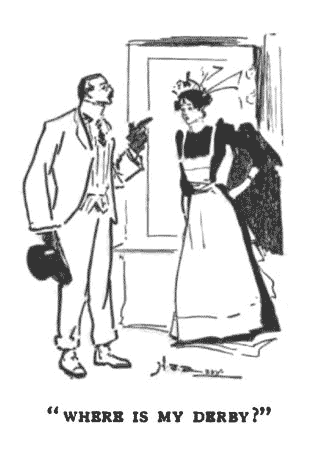 “Men are such fools!” cries Ethel, in exasperation, “If Mary takes your waste-paper basket away and forgets to bring it back, why don’t you ring and ask for it?”
“Men are such fools!” cries Ethel, in exasperation, “If Mary takes your waste-paper basket away and forgets to bring it back, why don’t you ring and ask for it?”
“Well,” stammers Benton, “I suppose I might do that.”
“I should think you might. Now why did you go into the kitchen for your hat?”
“Because I could not find it anywhere else. I looked everywhere, even in the ice-box; the kitchen was the only place left.”
“Did you find it there?”
“No.”
“Did you find your hat at all?”
“No; I had to get out my silker.”
“I’ll ask Mary if she knows where your hat is—your brown Derby, you mean?”
“Oh, you need not ask her,” laughs Benton. “I asked her when I came home. I know where it is now.”
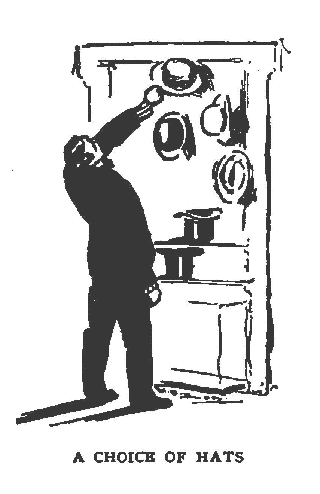 “Where is it?”
“Where is it?”
“On the hat-rack.”
“Where was it while you were looking for it?”
“On the hat-rack, I suppose.”
“And did you not look for it there?”
“Yes; but I could not see it. Mary had carefully hung my covert-coat over the hat.”
“It seems to me you must have been very stupid.”
“Well, I’ve had one experience with Mary and that hat before this; and the hat-rack would be the last place I should ever go to in search of it. I really had hopes of finding it in the kitchen, especially when I saw the basket there.”
“What experience have you had before? You never told me anything about it.”
“Perhaps I forgot to tell you, but I will tell you now. I was in a great hurry to get down to the office one morning about three weeks ago. I could not find my hat anywhere. I looked all over, and said all sorts of things in every known language. I even looked under the sofa in the parlor, and had a rush of blood to the head.
Then Mary came along, and I asked her where she had put my hat. And where do you suppose it was?”
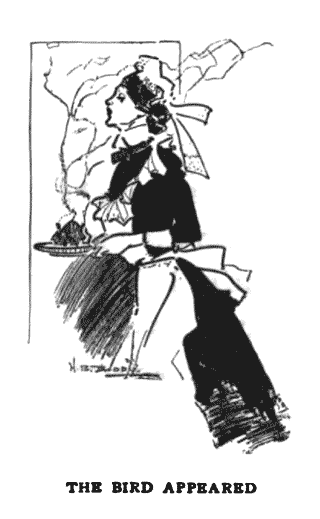 “I’m sure I can’t guess.”
“I’m sure I can’t guess.”
“In the only place I had not looked—”
“Of course!” triumphantly.
“In your music-stand.”
(Now this music-stand is a small mahogany cupboard that rests on four Colonial legs, and it is filled with horizontal shelves each about four inches above the other.)
“I never had any idea before,” explains Benton, “how low a Derby hat is, until I saw mine comfortably resting on one of those shelves.”
“The best thing for you to do,” comments Ethel, “is to buy another hat. Then there will probably be at least one that you can find when you want to go out.”
“Oh yes, I might buy any number of hats. But it would be cheaper to hire a valet.”
“To wear your hats for you, I suppose?”
“Well, possibly; but if I knew where my valet was, I could at least be sure of a hat.”
Hereupon there is a lull in the conversation, a lull which might have been quickly followed up by more plaints from Benton if the partridge—which had started the whole discussion—had not appeared, and by means of this same partridge, Ethel, knowing the weakness of man, skilfully turns the conversation into other channels.
The soup has only just been removed from the table, on a particular evening early in December, when Ethel Benton inquires of her husband if he has as yet given any thought to the important subject of Christmas presents.
“Is it not a bit early in the game to begin thinking of Christmas presents?” he asks. “The festive blackmailing season is still three weeks ahead of us.”
“I know it is,” replies Ethel; “but if we leave it until the last moment everything will be so rushed that we won’t half do things.”
“I rather think that is a good idea—not half doing things; especially those things.”
“I suppose you do,” she says; “but that is because you have not thought about it. To-day I made a list of people that we shall have to send presents to.”
“I suppose the mere clerical labor occupied you most of the afternoon,” remarks Benton.
“My dear, I am glad you choose to see the humorous side of this question at the outset. It will not strike you as quite so funny when—”
“When I see the list,” interrupts Benton. “I suppose not. Of course, we shall have to remember our ancestors with some trifling ‘compliment of the season.’ ”
“Trifling?” breaks in Ethel. “Do you suppose I would send mamma a trifle at Christmas?”
“Different people have different ideas about trifles,” explains Benton. “Now, you know, sometimes I think a thing is a trifle, and you consider it a matter of considerable importance.”
“Well, mamma gets a nice Christmas present,” maintains Ethel, firmly.
“Good for mamma!” returns Benton. “I suppose it’s ‘good for papa’ too. Who comes next?”
“Well, there is Dorothy,” begins Ethel, thoughtfully. “She must have something—she’ll send me something nice, of course. So will Statia and Cecil and Maude, and probably Lucy and Mrs. Thorpe.”
“What makes you think they will send things?” asks Benton.
“They always have.”
“They’ve got to stop some time. Perhaps they won’t send this year.”
“Oh yes, indeed they will. They’re certain to.”
“And you want to send them something in exchange?”
“No; I want to send them some little remembrance.”
“But you would not send them anything if you thought they were not going to send you something.”
“I should send to Dorothy, and certainly to Mrs. Thorpe. We are under obligations to Mrs. Thorpe, you know.”
“But so far as the others are concerned—Statia, Cecil, Lucy, and Maude—it is mere blackmail!”
“You certainly would feel very cheap if I got something from every one of them Christmas morning, and had sent nothing to any of them.”
“That’s why I call it blackmail.”
“I don’t quite see the connection, dear.”
“Well,” proceeds Benton, “you admit you are spending your money on these girls because you anticipate they will spend money on you.”
“I don’t think I admitted anything of the sort. I want to send presents to the girls. There is nothing to compel me to, however.”
“Nothing but the apprehension that if you don’t send something to Cecil, for instance, and she does send something to you, you will feel ‘cheap’ Christmas morning.”
“I certainly should,” maintains Ethel.
“Then your motive in sending holiday gifts is to protect yourself from that cheap feeling. Why don’t you try sarsaparilla?”
“Don’t be absurd, Arthur.”
“Certainly not; I am in dead earnest. I maintain that you—and not alone you, but almost all people—are morally blackmailed into making gifts from sheer dread of receiving something from some one to whom you have not sent an equivalent.”
“I don’t think it is very nice of you to put it that way,” objects Ethel.
“It may not be ‘nice’ but it is true, nevertheless. The modern Christmas-present idea is plain ‘give and take.’ Where is the holiday spirit in that sentiment? This is bringing the transaction down to pure commercial exchange.”
“If I thought you meant that, Arthur, I should feel very badly,” says Ethel, seriously.
“Well, perhaps I don’t really mean it in a harsh sense; but there is a basis of truth at the bottom of the statement. I believe in Christmas good cheer, and in gifts at Christmas-time. I believe in the adage that it is better to give than to receive, but I don’t believe in giving because you are going to receive—or think you are. I don’t quite see where the Christmas sentiment comes in if we calculate on probable receipts three weeks ahead of time, and go shopping accordingly.”
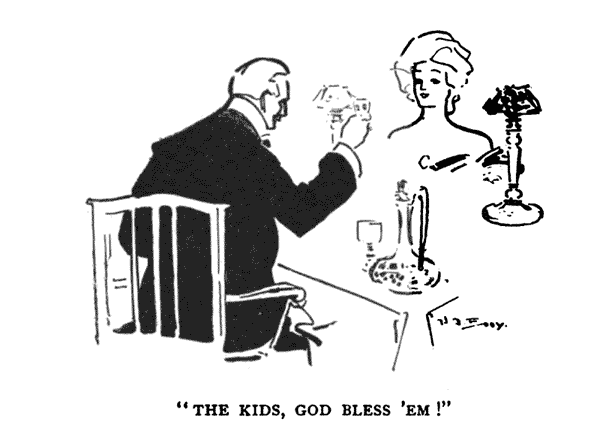
“That’s a very blunt way of stating the case,” expostulates Ethel.
“Perhaps it is; but, nevertheless, that is what we are doing. I dare say it is just what everybody does who gives Christmas presents. The only gift that carries the genuine Christmas spirit with it is the one that goes to a child. You may feel sure that anything will please a kid on that day. We grown-ups have been robbed of our Santa Claus; the little folks still have him, God bless ‘em!”
“Yes, that is all very true, Arthur,” returns Ethel; “but the cold, hard facts of that list of mine still face us, and we must think of what we are going to send those girls.”
“How many girls are there?”
“Six, including Dorothy.”
“Did they all come to time last year?”
“Yes; Dorothy sent me that beautiful Vienna vase.”
“Did any of them send anything you really wanted?”
“No; but it was sweet of them to send anything.”
“If you had taken the money you spent on gifts for them to spend on one article for yourself, you could have gotten something that you really wanted.”
“That’s a very selfish way of looking at it,” rejoins Ethel, sharply. “I got great pleasure out of sending presents to the girls.”
“I’ll bet you walked your feet off, and fought your arms off in the crowded shops.”
“I suppose I did; but all that is forgotten now.”
“You’ll get a reminder of it in a couple of weeks.”
“That’s just why I want to start in early—before the crush.”
“Well, I have a great idea!” exclaims Benton, suddenly and enthusiastically. “It has just come into my massive brain. It is beautiful, generous, sensible, and economical! Speaking of Santa Claus and the kids must have suggested it. It will enable us all to do a kind act, all you girls can give one another Christmas presents, and none of you need spend half as much money as your customary Christmas compliments involve.”
“Please explain how you are going to do away with that beautiful alliteration, ‘customary Christmas compliments,’ capably cancelled?”
 “Well, if you are going to do it at all, you must begin at once. Here is the plan: Each one of you seven girls spends from $20 to $25 on sending gifts to every other one. Suppose you write to Dorothy and the rest, saying that this year, instead of sending presents to them, and getting gifts in return, you will, and you want each one of them to, contribute $10 towards a fund to be devoted to buying toys for the kids at the Hospital for Crippled Children. That will make $70. You can buy a whole toy-shop with that, and pour a solar system of sunlight into those dark little lives. Part of the agreement, too, shall be that each girl may send to every other some card or flower—no expensive bouquet—on Christmas morning, if she chooses, but no gift.”
“Well, if you are going to do it at all, you must begin at once. Here is the plan: Each one of you seven girls spends from $20 to $25 on sending gifts to every other one. Suppose you write to Dorothy and the rest, saying that this year, instead of sending presents to them, and getting gifts in return, you will, and you want each one of them to, contribute $10 towards a fund to be devoted to buying toys for the kids at the Hospital for Crippled Children. That will make $70. You can buy a whole toy-shop with that, and pour a solar system of sunlight into those dark little lives. Part of the agreement, too, shall be that each girl may send to every other some card or flower—no expensive bouquet—on Christmas morning, if she chooses, but no gift.”
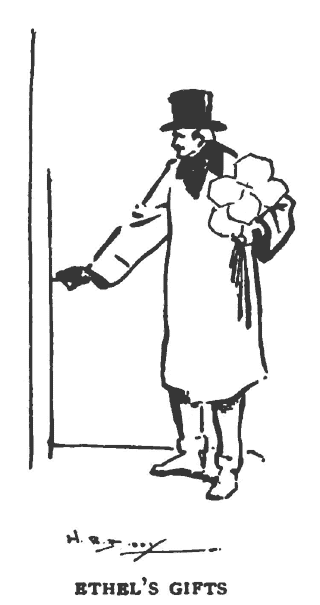 “Oh, Arthur,” cries Ethel, clasping her hands, “I think that idea about the hospital is just great! And what fun it will be buying the toys for those poor little children!”
“Oh, Arthur,” cries Ethel, clasping her hands, “I think that idea about the hospital is just great! And what fun it will be buying the toys for those poor little children!”
“Exactly,” replies Benton. “Now you are touching the key of the true spirit of Christmas-tide. Don’t you think you will derive a thousandfold more pleasure in purchasing a lot of gifts for those poor kids than in striving to find suitable presents for your friends?”
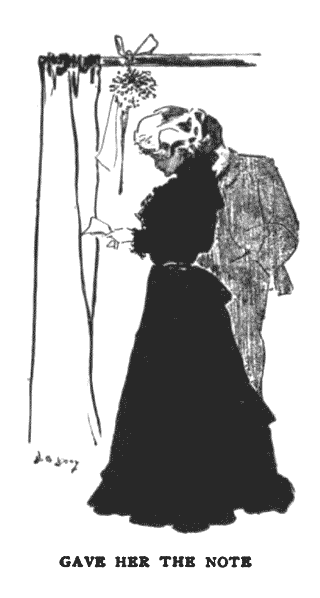 “Indeed I do,” assents Ethel; “but perhaps the other girls will want the fun of spending their own money. I’ll have them all here to lunch this week and propound your plan. Then we can decide how the toys are to be bought.”
“Indeed I do,” assents Ethel; “but perhaps the other girls will want the fun of spending their own money. I’ll have them all here to lunch this week and propound your plan. Then we can decide how the toys are to be bought.”
And Ethel did have the girls to lunch, and they were, every one of them, enthusiastic over Benton’s proposal. They went into the toy-buying business with fervor, and for a week previous to Christmas the Bentons’ looked like a storehouse. And two days before Santa Claus was due to arrive at the hospital, Benton drove there on the front seat of an express wagon, loaded with the proceeds of that seventy-dollar investment. He did more. He got seven of the brightest boys together, and told them how seven ladies had given up having Christmas presents in order that they should have toys, and he got each boy to write a note to one of the girls. On Christmas morning he gave to Ethel the note that was addressed to her, and he carried the other six scrawly missives of thanks to the other girls, leaving a bunch of violets with each as his wife’s gift. There were no more genuine Christmas offerings in town that day than the letters to those seven girls.
“Well, what do you think?” begins Ethel Benton, as she and her husband take their seats at the dinner-table.
This is a favorite interrogative of hers, and Benton finds it a difficult one to reply to. The number of suitable answers is certainly limited. He may say, “I don’t know,” which would be untrue. He may say, “I don’t think anything,” which would be derogatory to his self-esteem. He may say, “A great many things,” which would require a lengthy explanation; or he may say, briefly, “What?” which does not mean very much. As a rule he plays Irish, and replies with another query, thereby successfully throwing the burden of proof upon Ethel. So he does upon this occasion. He asks:
“What do you think?”
“Mamma wants to give a reception,” Ethel answers, proudly.
“That’s good. And you will receive with her, I suppose?”
“Oh—but she wants to give it here!”
“HERE!”
“Yes, in our house.”
“The deuce she does! Did you tell her these premises are not for rent?”
“I told her nothing of the kind.” This with dignity. “I think it is a very good idea.”
“Oh yes. It is a good idea—for her. One of the cleverest ideas she has evolved in a long while. The best since she thought it would be a good idea to have me for a son-in-law.”
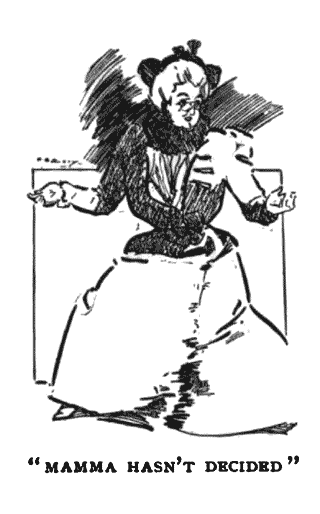 “But, honestly, don’t you think it will be nice? I was only going to have days, you know. So when mamma said she was thinking some of giving a reception, I told her she ought to let me give it, and put her card in with mine.”
“But, honestly, don’t you think it will be nice? I was only going to have days, you know. So when mamma said she was thinking some of giving a reception, I told her she ought to let me give it, and put her card in with mine.”
“Oh! then it was your idea?”
“Well—partly. But it’s mamma’s reception, in that she will pay all the bills. And we ourselves could never have afforded to give a reception.”
“Blessed be poverty!”
“What do you mean? I thought you would like it so much. It is very unkind of you to throw cold water on my plans like that. It is so ungrateful, too, when mamma is doing so much for us.”
“I’m not throwing cold water, my dear.”
“Well, then,” gleefully, “don’t you think it will be nice—”
“To have a lot of people cackling all day in the front rooms?” And here, unfortunately, Benton imitates the noise of hens—joyful hens in a barn-yard—a vocal specialty he had become quite proficient in as a small boy—“Kack, kack, kack—!”
“Stop it,” cries Ethel. “I never want to do anything that you don’t make fun of me, or try to put obstacles in my way. And,” almost tearfully, “I thought you would like it so much. We can make the parlor look so pretty, and I can have Dorothy and Mrs. Dufour and Mrs. Willis and Emma to help receive, and it will be perfectly lovely.”
“So you’ve got it all fixed?”
“No, I have not.”
“Where’s the hitch?”
“Mamma has not definitely decided that she will give the reception.”
“So this is a false alarm—I mean a—a faint hope, only?”
“I wish you wouldn’t be so mean.”
“I am not mean. I don’t intend to be mean. If you hold a reception, my dear, I shall come home early that afternoon, and rig myself up like a fatted ox, and stick a flower in my coat, and go about and show myself to the crowd. That’s what you want; that’s what you and your mother both want. I know it. I am willing to parade, if it’s going to give you any fun.”
“I think men are most ungrateful, inconsiderate creatures. If you do not wish to help your wife when she is entertaining her friends, you may stay away. I can get along very well without you.”
“But I do wish to help my wife, likewise my wife’s mother. And I have just told you I will come to the front like a soldier when you have your little party. By-the-way, is there going to be a punch?”
“Punch and bouillon. I shall not have any tea. It is too much trouble to make fresh tea all the afternoon.”
“I don’t care so much about the tea; but what kind of punch will it be?”
“Claret punch, of course.”
“Claret punch? Why don’t you have real punch? Now if you will let me brew the punch, I will guarantee that it will be a drawing card. The girl who presides over it will easily be queen of the drawing-room. I have a friend downtown who has a recipe for punch; he’s a barkeeper—”
“Arthur!” exclaims Ethel, with a horrified look.
“What’s the matter? Barkeepers usually know recipes—”
“But you said he was a friend of yours.”
“He has been—on many occasions. But I will call him an acquaintance, if you prefer. I’ll get his formula, and then, if you put on the cards that I shall brew the punch, you will have more men at your reception than will be seen at any similar function in New York this winter.”
“I have not any doubt of it. Anything to eat or to drink will attract a man. If I had the gift of story-telling I should write a book—a novel—about a country in which marriageable girls would go around with terrapin and canvas-back ducks in their hands as attractions for the marriageable men—just as you offer buns to the animals in a menagerie. There would be no old maids in that land, I can assure you, for the marriageable men would rush for the terrapin and the ducks just as their caged fellow-animals in the Park always grasp for the buns.”
“Really, Ethel, I don’t see how you ever brought yourself to an alliance with a specimen of such a sex.”
“I sometimes wonder at it myself; but I always find consolation in the thought of how much better off you have been since you were married, and I persuade myself that in this world it is the duty of the women to take care of the men. You know very well that you don’t know how to take care of yourself. It is a wonder to me how you ever got along so well as you did before we were married.”
All this because Benton made light of that reception scheme. He soon sees that he must mend his ways.
“Well, dear, what can I do to help you about getting up your shindy?”
“I wish you would not use such vulgar words, Arthur. If you are going to be good and kind and help me, why do you spoil it all by offering your services in such an unpleasant way?”
“I am yours to command, madam,” says he, bowing as gracefully as he can.
“Very well, then. The first thing you want to do is to go down to Tiffany’s to-morrow and see about those cards.”
“I ordered the cards for you several days ago.”
“You ordered cards with ‘Fridays in January and February’ on them. But if I am going to give a reception, of course I shall not want to have days at home.”
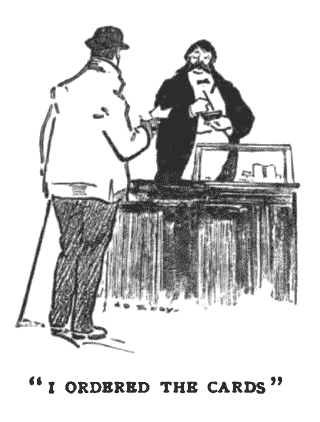 “But the cards must be all printed by this time,” objects Benton. “I told them to rush the order.”
“But the cards must be all printed by this time,” objects Benton. “I told them to rush the order.”
“Well, I don’t think they are engraved yet, because they sent me a note asking what size card I wanted, and I have not answered, so they won’t go on with the order till they hear from me.”
“Did they say so in the note?”
“No; but I know they won’t. While you are down there, get three hundred envelopes (and be sure you get them the right size), so that we can hurry things by getting the envelopes addressed before the cards come home.”
“I suppose your mother will come down and help you address the envelopes?” ventures Benton, hopefully.
“I suppose nothing of the kind,” Ethel promptly retorts. “You can address them in the evening yourself. It won’t take you long, and you write such a good hand.”
“Oh, la, la, la!” he shouts. “A good hand! Well, that’s news to me. What do you think I bought a type-writer for? I bought a type-writer because I got tired of hearing the printers complain that they couldn’t read what I wrote.”
“Printers are probably ignorant men,” sniffs Ethel, contemptuously.
“Printers are the cleverest decipherers of hieroglyphics in the world,” Benton returns. “But I can address those envelopes on the type-writer.”
 “Send out type-written invitations to a reception!” Ethel almost shouts. “You must be crazy! What do you suppose people would think of me?”
“Send out type-written invitations to a reception!” Ethel almost shouts. “You must be crazy! What do you suppose people would think of me?”
“Oh, well, if you are sending out these invitations to get a consensus of popular opinion concerning yourself, why don’t you have them addressed by Professor Graphohand?”
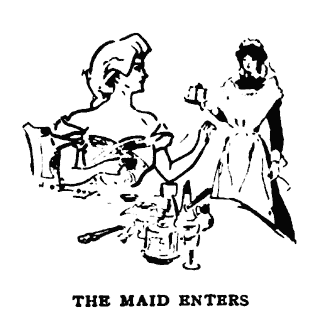 “I wish you would not be so absurd about these little things. Do what I tell you, and don’t make any comments. In the end you always admit that I am right.”
“I wish you would not be so absurd about these little things. Do what I tell you, and don’t make any comments. In the end you always admit that I am right.”
Then follow detailed and explicit orders as to what Benton shall do the following day in regard to the cards. As Ethel finishes giving her instructions the bell rings, and in a few moments the maid comes into the dining-room with a package, which, when opened, is found to contain the three hundred cards and envelopes that had been ordered a few days previously by Benton. The former bear the neatly engraved legend that Ethel will be at home to her friends on “Fridays in January and February.”
The dining-room table is stretched out to its full length by four leaves, and its snowy expanse is laden with vases of flowers, and dishes of fancy cakes and sandwiches, and piles of plates, and heaps of forks and spoons, and half-empty platters of variegated salad. It is the evening of Ethel Benton’s first reception as a bride, and she and her spouse now sit at one end of the board, where they have cleared away a small space in the caterer’s wilderness, making a pretence of dining; but as Ethel is almost too tired to eat, and as Benton has done nothing but munch sweets all the afternoon, they make little of the feast. It is eight o’clock, and the clocks are answering to the roll-call of time with their usual anachronistic promptitude.
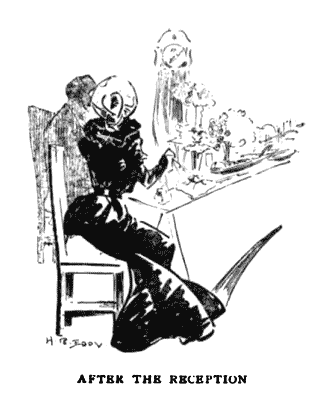 ‘‘I’d hate to be a French waiter,” remarks Benton, as he lights his cigar and pours a tumbler full of a light yellowish fluid which has done good service as punch during the afternoon.
‘‘I’d hate to be a French waiter,” remarks Benton, as he lights his cigar and pours a tumbler full of a light yellowish fluid which has done good service as punch during the afternoon.
“I should very well think you might,” replies Ethel; “but why?”
“Think of going about from house to house, like this, every day in the week, eating nothing but salads and sandwiches, and drinking anything from champagne to pink lemonade, for four hours each afternoon! I should think that on Sundays those fellows would positively revel in boiled corned-beef and ice-water!”
“Oh, I don’t think the waiters eat and drink so much at receptions as they are blamed for. They must get used to that sort of thing, just as girls in candy-shops get sick of eating candy.”
“Then all those fellows we had here to-day are novices,” affirms Benton. “I saw one fat fellow ladling ice-cream into himself at the rate of four quarts an hour. He was in the butler’s pantry, and I had gone in to see about more punch. As soon as I caught sight of him, I shouted, ‘Hi, there!’ but he never stopped; just nodded, and sputtered something that sounded like ‘oui m’sieur,’ and went on scooping up the ice-cream.
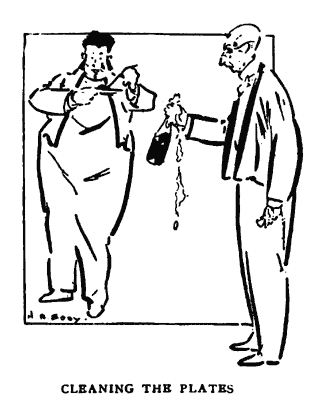 So I went up to him, and touched him on the arm, and asked him if he would not have a chair, and could not I bring the freezer in and set it down beside him, and, if he would wait a minute, I would get the soup-ladle and a funnel, and send another man in to help. Well, that was all wasted on the Frenchman. He merely put down the empty plate, and took up another that had a half-melted dab of pink stuff on it, and said between gulps: ‘I am ze man zat wash ze plate. It is ver’ hot in ze kitcheen, over ze hot water for ze plate, so I make myself cold first, and zen I wash ze plate. It is also quicker to eat ze ice-cream as to scrape it off before washing ze plate.’ If you had seen him eating you would have admitted the truth of that last statement. So, as long as his gorging himself was strictly professional, I said nothing more.”
So I went up to him, and touched him on the arm, and asked him if he would not have a chair, and could not I bring the freezer in and set it down beside him, and, if he would wait a minute, I would get the soup-ladle and a funnel, and send another man in to help. Well, that was all wasted on the Frenchman. He merely put down the empty plate, and took up another that had a half-melted dab of pink stuff on it, and said between gulps: ‘I am ze man zat wash ze plate. It is ver’ hot in ze kitcheen, over ze hot water for ze plate, so I make myself cold first, and zen I wash ze plate. It is also quicker to eat ze ice-cream as to scrape it off before washing ze plate.’ If you had seen him eating you would have admitted the truth of that last statement. So, as long as his gorging himself was strictly professional, I said nothing more.”
“Why did you not tell the poor man he would ruin his digestion?” asks Ethel, ingenuously.
“He would not have understood,” replies Benton, seriously. “Besides, he is not the first man that has been carried away by professional zeal to his undoing. I only started out to say that I would not choose the business. And now that this hurrah is all over with, I’m going to get a good night’s rest. I never saw so many people in my life that I did not know.”
“Well, you see,” explains Ethel, “there were a great many of my friends here that you had never met.”
“Oh, but I told them all I had met them, you see. I kept saying I knew their faces very well—that I remembered having seen them at the wedding.”
“But lots of them were not at the wedding!” exclaims Ethel. “How absurd of you!”
“Oh, I don’t mind a little thing like that,” continues her husband, calmly. “They should have been at the wedding, and if they were not, they were no doubt pleased that I thought they were there. At any rate, none of them disabused me. But I started the day too well to be bothered by small matters. No social amenity could phase me after my initial performance!”
“I hope you were not rude to any one,” ventures Ethel.
“Of course I was not rude to any one! How foolish of you! I gave them all the glad hand and the India-rubber face—as Freddy says. By the way, that boy Freddy has some marvellous expressions in his vocabulary. He is a youth of infinite possibilities. I shall cultivate him. Dorothy ought to be proud of such a brother. I found him in the pantry too—helping my fat friend to ‘wash ze plate’ by the absorption process. Freddy said he was tired of ‘rubber-necking’ in the parlor—whatever that may mean. But I imagine from the way my neck feels that I must have been rubber-necking all day.”
“Won’t you please get back to your main subject, Arthur, dear,” interrupts Ethel, mildly. “You started in to tell me about your ‘initial performance.’ ”
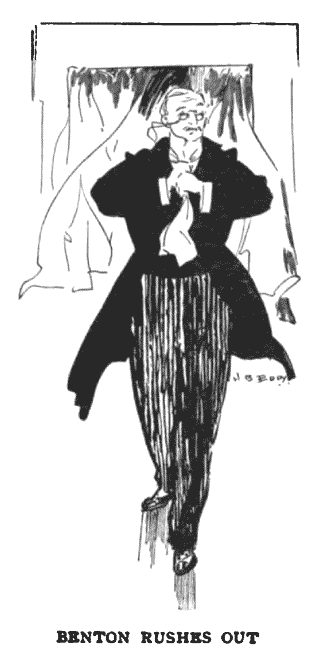 “Oh yes; my début, so to speak,” resumes Benton. “You remember at three o’clock Dr. and Mrs. Badminton Jones’s cards came in, and you chased me out into the parlor almost before I had my necktie arranged, simply because you were not ready—and it was three o’clock, you know.”
“Oh yes; my début, so to speak,” resumes Benton. “You remember at three o’clock Dr. and Mrs. Badminton Jones’s cards came in, and you chased me out into the parlor almost before I had my necktie arranged, simply because you were not ready—and it was three o’clock, you know.”
“Yes, it was three o’clock,” admits Ethel; “but when you send out invitations to a reception ‘from three until six’ no one is expected to come until four. No one has any right to expect the hostess to be ready at three.”
“Well, I don’t know anything about that,” returns Benton, “but I know I rushed into the parlor to see the anticipatory Joneses. You said I must be very nice to them because they had sent us those salad forks for a wedding present. (All your friends seem to be classified according to the wedding presents they sent you.) As I entered the parlor I saw a lady sitting in an arm-chair in about the middle of the room, and a fellow with a gray mustache standing near the window. I stepped briskly up to the lady, and said, ‘How do you do, Mrs. Jones?’ and she got up smiling, and said she was not Mrs. Jones. ‘I am Mrs. Warren. Don’t you remember me?’ ‘Why, of course,’ said I. ‘Mrs. Warren, I remember you perfectly.’ And I thought Mary must have brought in the wrong cards, so I turned to the man, and gave him the ‘glad eye’ (I get all these expressions from Freddy), and said, ‘And how is Mr. Warren to-day?’ The fellow grinned, and said, ‘I don’t know; I’m Dr. Jones.’ So then we all laughed, and I felt like a blooming fool—which is part of the game, I suppose. ‘I knew there were some Joneses in here somewhere,’ said I, then, with a forced ‘ha-ha!’ ‘because I have receipts for them,’ and I held up the cards.”
“The idea of your using such a term as receipts!” interrupts Ethel. Benton pays no attention to her exclamation.
“ ‘But where is Mrs. Jones?’ said I, looking about. ‘You can’t pass off Mrs. Warren as Mrs. Jones—I know Mrs. Warren too well!’ You see, I was bound I should make a good bluff; and just then you came in, and Jones explained about his wife’s being ill, and I took Mrs. Warren in and gave her some punch. I think she went away fully propitiated.”
“You certainly made a nice mess of that,” remarks Ethel. “I hope you did not do anything else like it during the afternoon.”
“Nothing exactly like it,” says Benton.
“Did you do anything at all similar?” cries Ethel.
“Your mother may think so,” replies her husband. “But she ought to know that those things will happen at receptions, and in affairs of that nature it is always a case of sauve qui peut!”
“Well, what was this?” asks Ethel, resignedly.
“Nothing much. A girl came in—well, I won’t call her a girl; she’s on the shady side of thirty-three—and I don’t know where you were. Anyhow you weren’t at the post of danger near the door where you should have been. But She saw me, and perhaps She recognized me; at any rate, She knew me for the host, probably from my shamefaced and repentant look. She waltzed up, and shook hands, and I could not have told her name—and can’t now—to save my life! But She thought I knew her. I had her hypnotized—until your mother came along. If she had not been so officious she would not have gotten herself into trouble. But she wanted to do the great mother-of-the-hostess act, you know, and so she stopped and put her oar into our conversation. ‘Why, how do you do, Mrs. Manley?’ exclaimed She, graciously. Your mother how-d’ye-doed, and smiled, and said she was awfully sorry that she could not call the visitor by name, and tried to turn the joke on me by saying, ‘Arthur, why don’t you introduce your mother-in-law?’ But I got back at her. I said: ‘What? You don’t mean to say you don’t remember this lady’s name? Why, you ought to know it as well as your own!’ ‘Of course, of course,’ said your mother, ‘but—’ ‘Why, the idea of your forgetting me, Mrs. Manley,’ exclaimed She. ‘Why, the idea!’ I shouted. ‘But I won’t tell you! If you forget your friends, I shall not be responsible!’ And then I said something about Mrs. Tararum at the other end of the room motioning to me, and excused myself, and escaped. I did not see your mother before she went.”
“WHAT makes you late, Arthur?” asks Ethel, as Benton strides into the dining-room after all the clocks have had their say about the time o’ day. “Collar-button?”
“No,” solemnly; “although I suppose that misfortune will come in due time—or go, rather. I’ve been decorating my room.”
“Decorating your room? At this time of the evening? Is that why you wanted the step-ladder?”
“Yes; I’ve been hanging a warning to the ghost.”
Ethel looks up in mild surprise, and then suddenly suspecting that her liege lord is laying a trap for her, she says:
“What do you want me to say, dear?”
“Say nothing,” returns Benton, “unless you can suggest some way of laying the ghost.”
“I suppose you have some private joke about a ghost, and you want me to ask, ‘What ghost?’ ”
“No, indeed,” he asserts, seriously. “There is nothing private about this ghost, or to this ghost. He has no respect for private property. I know from experience.”
“Do you know what you are talking about?” asks Ethel.
“I do. I am talking about the ghost in my room.”
“So you have been seeing ghosts?”
“No; I have never seen this ghost in the essence, I merely know him by the deeds he has done.”
“Indeed. He must be an interesting ghost. What does he do?”
“Well, he has done a number of things. But he is not so interesting as he is expensive. He is responsible for much profanity, too. For instance, his last feat has been to take my shears—you know those nice long shears of mine?”
“The ones Mr. Sanders gave you?”
“Exactly; I have had them five years now, and until last week they were as good as new. But now the point of one blade is snapped off a quarter of an inch from the end, and the other point is twisted so that the blades won’t close.”
“How did that happen?” asks Ethel, straightening up, for she knows how sacred Benton holds all things on his desk.
“Don’t ask me. The ghost alone knows. I think he is partial to silver polish. He is probably a silver-lined ghost. Perhaps ghosts, like clouds, have a silver lining.”
“Oh, Arthur, do be serious,” exclaims Ethel, nervously.
“I never was more serious in my life.”
“Well, then, say what you mean. Are your scissors broken?”
“They are—not only broken, but ruined; they are of no further use, and, according to the veracious and credible statements of the truth-telling women of our household, not one of them had a hand in the destruction of the article, and none knows how or when the deed was done. So I have hung them up on the wall.”
“Did you ask Mary about them?”
“I asked them all. I don’t suppose you have been using my shears to pry open tin cans or windows, have you?”
“Of course not,” in an injured tone. “I never touch anything on your desk.”
“Very well, then,” resignedly, “it was the ghost—and he likes silver polish.”
“What do you mean by ‘he likes silver polish?’ “
“Well, after questioning all the servants, threatening them with the broken scissors the while, and after receiving absolute and categorical denials from all three that they knew anything about how the points were injured, I started in on a little investigation of my own. This was yesterday afternoon—Sunday; they were all out. I went at it in the regular Sherlock Holmes style. It was evident that the point of that blade was snapped off by some one (of course it was the ghost, for no one else did it) in attempting to pry open something. What would any one attempt to pry open? A box or a bottle. We have corkscrews in this establishment, but I never saw a woman yet who did not prefer to pry out an obstinate cork with a pair of scissors rather than to use a corkscrew. So I decided to examine all the corks in the house. At last I found a bottle of silver polish in the butler’s pantry, and it was easy to see that the cork had been attacked with some sharp instrument gouged in along its sides. Therefore it is probable that the ghost, being thirsty, got the cork out of the silver-polish bottle with my scissors. He must be an effeminate sort of a ghost, to prefer scissors to a corkscrew, and he is no doubt silver-lined. He wanted to polish off his insides, I guess.”
“When did you discover the broken scissors?” asks Ethel, quickly.
“Sunday morning.”
“Mary cleans the silver in your room and in the bedrooms Saturday afternoon.”
“That looks suspicious for Mary. But, my dear, there is nothing to be done about it now. We can’t call her a liar. All we can do is to lay it to the ghost. I have delivered a lecture on corkscrews to each and every one of your servants, and if the ghost ever uses scissors on corks again in this house it will be a sign for the massacre of your handmaids. That is all. My spleen is spent. Let us leave the ghost to his next adventure. But woe betide him if he touches my razors or the carving-knives! Now, what do you know that is new?”
“Nothing much,” answers Ethel, “except that Dorothy was here this morning.”
“Indeed,” says Benton. What did she have to say?”
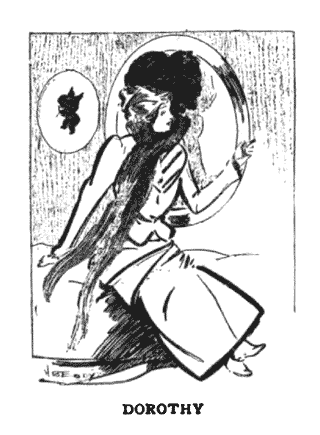 “She says Mr. Leroy has come over from Philadelphia to remain a week.”
“She says Mr. Leroy has come over from Philadelphia to remain a week.”
“Oh!” says Benton. “I suppose the town will be full of country people for the next few weeks. Leroy must have come in to get his spring clothes. He’s that chap who was so attentive to Dorothy last summer, isn’t he?”
“Yes,” says Ethel, enthusiastically. “I think, from what Dorothy says, that she is very fond of him too. She is going to bring him to call.”
“I suppose we shall have them to dinner, then?”
“Why, of course,” exclaims Ethel. “I should think you would be glad to give them a chance!”
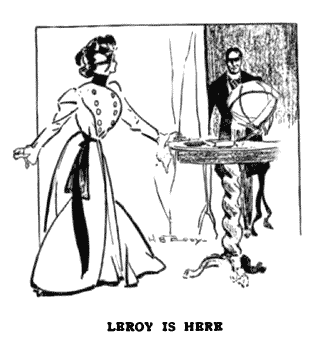 “I am glad to give them a chance—all the chances they want. But, my dear, we can’t run a matrimonial agency here, you know. There’s a clause in the lease against conducting any business on the premises.”
“I am glad to give them a chance—all the chances they want. But, my dear, we can’t run a matrimonial agency here, you know. There’s a clause in the lease against conducting any business on the premises.”
This last remark because Ethel had once expressed a desire to see Dorothy happily wedded.
Dorothy had been Ethel’s maid of honor when she was married to Benton, not many months before, and of course that gave her privileges. Dorothy is the kind of girl that likes privileges, too; perhaps for that reason Ethel had made up her mind that she must marry her off—so that some other girl might have privileges from Dorothy.
“Don’t you wish we had had somebody to invite us out to dinner when we were engaged?” pursues Ethel, disdaining to notice the matrimonial-agency reference.
“But Dorothy is not engaged, is she?” asks Benton.
“I don’t know whether she is or not. She hasn’t told me.”
“I don’t see why we should precipitate matters,” continues Benton.
“Why not? Aren’t you happily married?”
“Of course, my dear; but you can’t measure the affairs of others in your own little bowl of happiness.”
Ethel makes no reply, and Benton advances another argument against aiding and abetting the young couple.
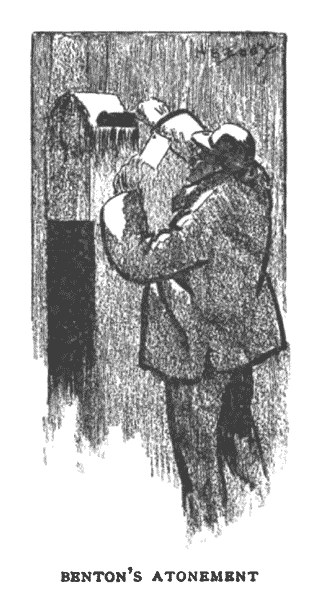 “It will mean an expensive wedding-present.”
“It will mean an expensive wedding-present.”
“What will?” asks Ethel.
“Dorothy’s marriage.”
“Well,” she exclaims, straightening up, and giving her husband a look of reproach that is withering, “well—if you are going to let that sort of thing enter into the question of making other people happy, you needn’t discuss these matters any further with me! The idea of your growling about a wedding-present for Dorothy!”
“I am doing nothing of the kind,” laughs Benton, somewhat sheepishly. “If Dorothy gets married she shall have as fine a present from us as from any one—only I think the longer she waits the finer it will be. Why don’t you embroider something for her?”
“I!—embroider something!” gasps Ethel. “Do you think I have nothing else to do? That’s just like a man! Who do you suppose takes care of this house? I’d like to see it at the end of three days if I sat around making embroidery!”
Then Benton listens to a long explanation of the woes of the young housekeeper; and when Ethel has talked until she thinks he is properly impressed, she says, “There, now; you don’t give me credit for anything!” And although she says it firmly and impressively, Benton knows she does not even believe it herself.
And so he steers the conversation back to Dorothy and Leroy, and when they arise from the table, a few minutes later, Ethel goes directly to her desk in the sitting-room and writes to Dorothy, asking her to come to dinner, and to bring the young man with her, and as a sort of postprandial punishment for his lack of interest in the maid of honor’s affairs, she makes Benton put on his top-coat and go out to the corner to mail the letter.
ON the evening set for their entertainment, Dorothy and Leroy come to dinner at the Bentons’. As Benton puts it afterwards, they are on time in a crescendo sort of way. They ring the front-door bell as the hall clock strikes; Dorothy gets her prinking done by the time the parlor clock is ready; and, to the great satisfaction of Ethel, the dining-room ormolu chimes pleasantly just as they sit down to table.
Dorothy is beaming, and Leroy wears an expression of proprietorship which has entirely displaced that nervous and somewhat apprehensive manner he used to carry about with him before. Much to Ethel’s relief, Benton behaves very well during the early part of the dinner; but Ethel has admitted that, for this very reason, she suspected he had some fiendish scheme in reserve.
And, as usual, Ethel is not far wrong. Benton lets fly with his first arrow over the salad. He chooses Dorothy as his victim.
“Dorothy,” he asks, with deliberation, “do you think that love interferes with appetite?”
Dorothy looks up somewhat apprehensively. She glances quickly across the table at Leroy, and a little red cloud sweeps over her cheeks. Ethel leaps into the breach.
“It does not seem to interfere with your appetite!” she exclaims, addressing her husband.
“No,” continues Dorothy, seizing the opportunity to turn the tables on Benton; “I never saw any one grow so fat as you have since you were married.”
“Oh, pshaw!” says Benton, calmly; “that isn’t the point. You can’t hold me up as a horrible example. But, supposing it is true that love and avoirdupois walk hand in hand—would you care to marry a fat man, Dorothy?”
“It is only unrequited love,” interrupts Ethel again, “that causes unpleasant physical results.”
“Indeed!” exclaims Benton, with a great show of interest. “I am so glad to see that Dorothy has dined well. By-the-way, Leroy, how much do you weigh?”
Leroy stammers out some figures (which are absurdly inadequate for a man of his build), and plunges his nose into a glass of ice-water, while Ethel glares at her husband and fidgets with a fork. Benton looks back innocently, and says, “Stop kicking me under the table,” which throws Ethel into a great embarrassment, for the poor girl is wholly guiltless of any subtabular telegraphy (if that familiar connubial method of communication in the presence of guests may be thus designated).
Having in this manner achieved a temporary advantage, Benton proceeds: “You could very well carry a little more weight, Leroy.”
“Oh yes,” he replies, bravely. “I guess I’ll have to fall in love.”
“That’s a very good determination to come to,” agrees Benton; and then he asks, innocently, “What sort of a girl would you fancy?”
But Ethel stanchly jumps to the rescue once more.
“It is very difficult to describe one’s ideal, is it not, Mr. Leroy?” she says. “I have just been reading a book in which a man starts out to search for his ideal in woman, and he never finds her, because his ideal keeps constantly changing. Have you read The Searcher?”
“No; I haven’t seen it,” answers Leroy, much relieved at the change of subject.
“And you don’t want to,” asserts Benton, emphatically. “That fellow was a chump—that Searcher. He did not know his own mind. But if you want congenial reading, I should think ‘The Duchess’ would appeal to you about now.”
“Mr. Leroy didn’t say he wanted ‘congenial reading’—whatever you may mean by that,” retorts Ethel.
“Oh, well, he knows what I mean—doesn’t he, Dorothy? And I say, Dorothy, do you think that young people who become engaged should announce that fact to their friends at once?”
“I do not,” replies Dorothy, with decision.
“Why not?”
“There might be a great many reasons for not announcing it.”
“But, of course,” continues Benton, in a confidential tone, “if you were engaged you would tell us, wouldn’t you?”
“I don’t know that I should.”
“I should think you would rather tell us yourself than to have some one else tell us, or than to have us guess it.”
“Well, you are such a good guesser,” returns Dorothy, sharply, “that I shouldn’t be surprised if at any moment you guessed I was engaged.”
“Oh no,” returns Benton, coolly, “I shall never have to guess that.” This reply disconcerts Dorothy somewhat, but she rallies capitally, and exclaims:
“Do you, then, expect me to be an old maid?”
“Not from present indications.”
“Then what do you mean,” persists Dorothy, “by saying you should never have to guess I was engaged?”
“I mean simply that, so far as I am concerned, the guessing stage is past.”
“Arthur,” puts in Ethel, at this point—for it is apparent that Leroy is having a woful time of it—“Arthur, can’t you find something else to talk about?”
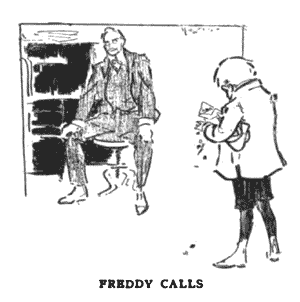 “Certainly,” he answers, cheerfully. And then, as if struck with a new idea, he says, “I will tell Dorothy about Freddy,” and thereupon turns, beaming triumphantly, towards Dorothy. “That little brother of yours is a precocious child for one of twelve,” he says, and pauses, as if his statement required confirmation. Dorothy glances quickly across the table at Leroy, who shifts uneasily in his chair.
“Certainly,” he answers, cheerfully. And then, as if struck with a new idea, he says, “I will tell Dorothy about Freddy,” and thereupon turns, beaming triumphantly, towards Dorothy. “That little brother of yours is a precocious child for one of twelve,” he says, and pauses, as if his statement required confirmation. Dorothy glances quickly across the table at Leroy, who shifts uneasily in his chair.
“Indeed he is,” Dorothy finally whispers.
“He came down to see me in my office this morning,” continues Benton, dispassionately, “on one of his semi-annual tours in quest of foreign postage-stamps. I usually have some in a little box for him. Freddy was very communicative this morning.” Here Benton pauses again, but there is a grim silence at the dinner-table, and Ethel foresees impending calamity.
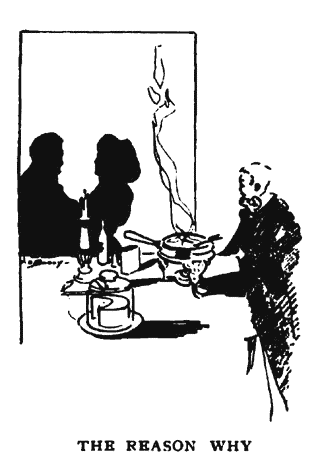 Soon Benton resumes. “I told Freddy we expected you here to dinner tonight—you and Leroy—and Freddy said he guessed you would be hungry, because he did not think you got much Welsh rarebit last night. It seems, Ethel,” continues Benton, turning from Dorothy to his wife with great seriousness, “that Mr. Leroy is an expert at making Welsh rarebits, and that he set about preparing one of those succulent dishes for Dorothy and himself in the ancestral banqueting-hall of Dorothy’s father’s mansion last evening at a late hour. It seems also that one Frederick, a junior brother to the aforesaid Dorothy here present, having delayed retiring far beyond his accustomed hour—being absorbed in the sanctity of his own apartment (and by the aid of a bull’s-eye lantern) in reading a soul-stirring literary effort with an alliterative title which has now escaped me—scented the tempting and succulent vapor of the bubbling cheese, as it floated upward from below. Now this Frederick,” continues Benton, dragging out the thread of his narrative to the greatest possible length, while his three listeners, with various emotions, nervously await the climax—“this Frederick, as I have stated, and as Dorothy, his sister, has confirmed, is a precocious youth. He realized at once, of course, that where there was odor there must be substance; so he forthwith deserted the heroine of his romance and descended noiselessly to the butler’s pantry—knowing full well that a heroine of fiction will keep, whereas an occasion to despoil the family larder is a chance which, in a well-regulated household like Freddy’s, offers but rarely, and must be seized without delay by him who desires to profit of his opportunities.
Soon Benton resumes. “I told Freddy we expected you here to dinner tonight—you and Leroy—and Freddy said he guessed you would be hungry, because he did not think you got much Welsh rarebit last night. It seems, Ethel,” continues Benton, turning from Dorothy to his wife with great seriousness, “that Mr. Leroy is an expert at making Welsh rarebits, and that he set about preparing one of those succulent dishes for Dorothy and himself in the ancestral banqueting-hall of Dorothy’s father’s mansion last evening at a late hour. It seems also that one Frederick, a junior brother to the aforesaid Dorothy here present, having delayed retiring far beyond his accustomed hour—being absorbed in the sanctity of his own apartment (and by the aid of a bull’s-eye lantern) in reading a soul-stirring literary effort with an alliterative title which has now escaped me—scented the tempting and succulent vapor of the bubbling cheese, as it floated upward from below. Now this Frederick,” continues Benton, dragging out the thread of his narrative to the greatest possible length, while his three listeners, with various emotions, nervously await the climax—“this Frederick, as I have stated, and as Dorothy, his sister, has confirmed, is a precocious youth. He realized at once, of course, that where there was odor there must be substance; so he forthwith deserted the heroine of his romance and descended noiselessly to the butler’s pantry—knowing full well that a heroine of fiction will keep, whereas an occasion to despoil the family larder is a chance which, in a well-regulated household like Freddy’s, offers but rarely, and must be seized without delay by him who desires to profit of his opportunities.
“But it appears that Leroy had requisitioned most of the delicacies upon which the youthful Frederick had set his gastronomic eye, and the boy must perforce sit himself down in idleness, and await the departure of his elders from the banqueting-hall, heretofore referred to, designated and described. It would seem, however, that the manufacture of the Welsh rarebit, which had been the cause of tempting Frederick from the privacy of his own apartments, failed to progress with that rapidity which the said Frederick considered proper and requisite at the hands of one as expert as he believed Leroy to be. Frederick, therefore, consumed as well by curiosity as by the gnawing tortures of famine, determined to attempt a quiet reconnaissance into the main precincts of the banqueting-hall. Whereupon the cause of the delay in the preparation of the rarebit came upon Frederick with such suddenness that he disregarded the presence of a heavy piece of furniture, thereby causing those discovered to discover him—”
“That will do, Arthur,” exclaims Dorothy, leaning back in her chair and holding her napkin to her face, “that will do. We will acknowledge it. I was afraid Freddy could not keep still. But please don’t say anything about it until I get my ring!”

“It was ordered this morning,” says Leroy, as Benton shakes him vigorously by the hand.
Then there is a toast, and another toast, and much hearty laughter. And as Leroy struggles into his overcoat later, he turns and whispers to Benton something about Freddy, which Benton absolutely refuses to repeat to Ethel.
THE invitations to the wedding of Dorothy and Leroy were issued, after the usual custom, at an early enough date for friends in distant localities to have ample time in which to determine upon, secure, and despatch their presents, so that these might be displayed with the other contributions on the day of days. At least that is the way Benton puts it when Ethel tells him at dinner one evening, some three weeks previous to the date set for the momentous event, that Dorothy’s cards have come.
“And I suppose we draw front seats and meal-tickets,” he adds, irreverently.
“We are invited to the church and to the house—if that is what you want to know,” replies Ethel, archly.
“That is the supposition I desire to have verified,” retorts Benton, with much gravity. “And are we in for a breakfast, or is it to be a supper?”
“It is to be a noon wedding,” says Ethel.
“That means no luncheon for me, and a dinner spoiled; but I suppose—”
“It appears to me,” interrupts Ethel, “that your thoughts seem to dwell principally on things to eat whenever any social function is under discussion. Unfortunately you seem to be endowed with the mental development of a caterer—”
“Now, my dear,” Benton breaks in, quickly, “you should not take advantage of the superiority of your sex over gastronomical requirements to refer to your humble spouse as being provided with putty instead of cerebra in his cranium—for, from what little opportunity I have had for observing such matters, I have uniformly noticed that, even at wedding receptions, the majority of the guests are always to be found in the refreshment-room.”
“That is so,” admits Ethel.
“And three-quarters of the crowd consists of women,” persists Benton.
“True,” says his wife, placidly.
“Well?” he asks.
“It’s because they want to be where the men are,” she returns, with a triumphant smile, “and what few men are present are invariably banked up three rows deep at the sideboard. But I don’t see that all this has anything to do with the case, my dear. The question which now faces us is to see about a present for Dorothy.”
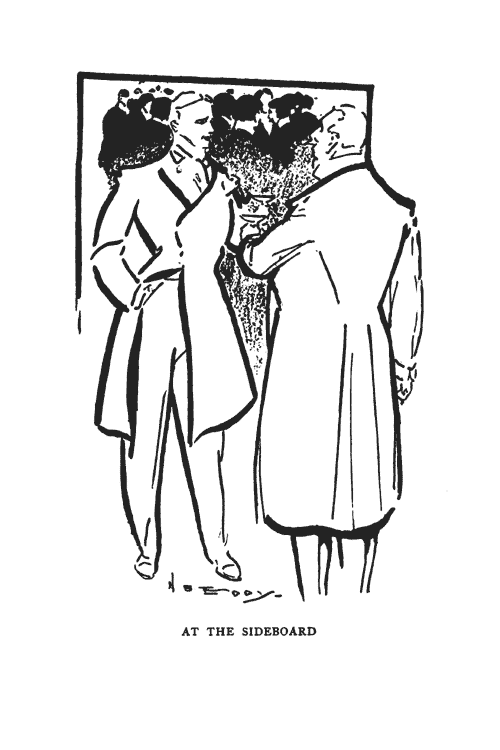
“That’s so,” nods Benton, between bites into a stalk of celery. “We’ve got to come up with our blackmail—there’s no dodging it this time.”
“Dorothy gave us a handsome present, you know,” proceeds Ethel, “and her mother sent us that silver dish, and even Freddy sent us the spoon that goes with it.”
“Yes—Freddy! I’ll bet he didn’t know anything about it until he was told. But he is not getting married yet, is he? We don’t have to get square with the whole family, do we, because Dorothy has got the drop on us?”
“No; but we must send her something really nice.”
“Silver, or cut glass?”
“Silver, by all means,” says Ethel, dictatorially.
“I don’t suppose we can work off our stock gift of a Dutch decanter and six glasses on Dorothy, can we?”
“Well, I should say not! You have got to make up your mind, Arthur, to give Dorothy something really fine.”
“Blackmail as is blackmail, eh?”
“We are under great obligations to Dorothy, and to all the family—and I wish you would not constantly refer to wedding-gifts as blackmail.”
“Well, call it tribute, then,” suggests Benton. “I suggested a great scheme to Leroy the other day. Thornton told me about it. The idiot—I wish he had told me the trick before we were married. If he had, we would not have such a stock of coffee-spoons and oyster-forks to pay storage on as we have now.”
“Something about presents?” inquires Ethel, with alacrity.
“You bet,” returns Benton, emphatically. “Great, too. Thornton says he worked it in fine shape. After their sight drafts had been issued—”
“Their what?” asks Ethel.
“Well, their wedding-cards, if you like. After these had been sent out—with meal-tickets distributed judiciously among those considered most likely to come down with the heaviest tribute—Thornton and his girl went around to Jiggany’s and Boreham’s and Blacking’s and Scar’s, and all those places where people get silver things under compulsion, and told the head men they were going to get married—”
“I don’t see why they wanted to go around town and tell the shopkeepers,” interrupts Ethel.
“Well, you wait, dear. That’s the great scheme. They took these fellows into their confidence, and explained to them that they were young people about to be married, and that they were going to set up housekeeping; and Thornton told ‘em he had a sister who had recently been married—”
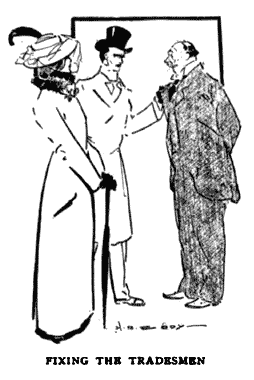 “I did not know Mr. Thornton had a sister!” exclaims Ethel.
“I did not know Mr. Thornton had a sister!” exclaims Ethel.
“Of course he has not any sister,” replies Benton. “This was only a property sister, a sort of bugaboo sister to hold up and shake at the silversmiths. Well, he said his sister got an absurd number of dozens of teaspoons and soup-ladles and bonbon-dishes and sugar-tongs and salt-cellars and asparagus-forks—all marked. Of course she could not use more than one asparagus-fork at a time, and not enough times in her life to wear it out; and, besides, she did not like the idea of cornering the market on asparagus-forks. But the beastly things were all marked; so were the spoons and the soup-ladles and the bonbon-dishes and sugar-tongs and saltcellars. The sister tried to exchange them, but the shopkeepers did not want them back because they were marked; At Boreham’s and Jiggany’s, Thornton said, they were willing to take back some of the marked stuff—the pieces that could have the marking rubbed off—but of course the exchange was made at a big discount, and nobody, not even a bugaboo sister, when out for blackmail and tribute, and all that sort of thing, likes to get touched for a discount. So Thornton explained all this, and made out a good case to the shopkeepers, and then he gave them his girl’s card, and the shopkeepers and superintendents agreed that, no matter if any person who bought presents for her there asked to have the goods marked, they would deliver them unscathed to the bride-elect, who might afterwards, if she wished, exchange them for umbrellas or picture-frames or teacups or music-boxes or pocket-books, or anything else she chose. Thus the newly wedded couple would avoid an overstock of duplicates, and the tradespeople would not be bothered with rubbing out monograms and figuring discounts—and both sides were satisfied with the arrangement.”
Here Benton pauses, and folds his hands placidly, and gazes across the table at his wife, as a man does who has dispelled the gloom of nations. Ethel has listened attentively, with increasing awe and dismay. Finally—
“What a cold-blooded and calculating man your friend Mr. Thornton must be!” she exclaims.
“Not at all,” returns Benton. “He has a great head for business.”
“And no heart for sentiment,” asserts Ethel. “I would much rather have my presents marked and stored than to go about dickering with shopkeepers to see how much I could make out of my friends.”
“That’s your view of the situation; and I don’t say you are not right,” admits Benton; “but I can also recognize advantages in Thornton’s method.”
“I can’t see any advantages anywhere,” persists Ethel. “I suppose your friend had an auction of silverware after the wedding, and bought stocks and bonds with the proceeds?”
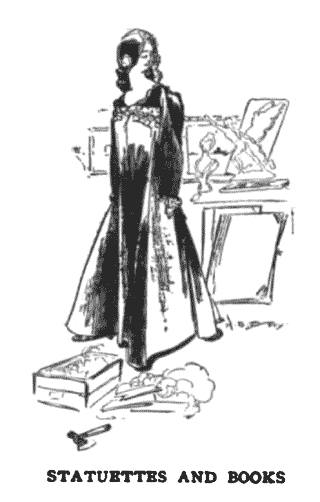
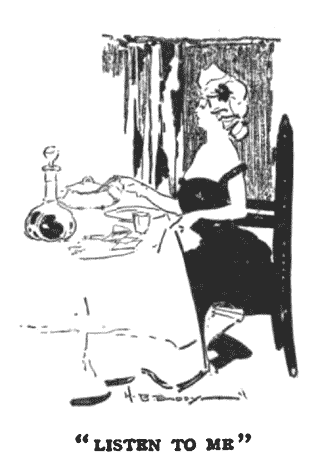 Benton chuckles. “Well, not exactly,” he replies, finally, “although he might have, if he had had the chance. But fate decreed otherwise. It was a good joke on Thornton. You see, he had counted without his hosts—or his victims, more properly speaking. The girl he married, you know, was one of those artistic creatures, and most of her friends were on to that fact, and they sent her statuettes and porcelains and pictures and plaques and art-books that weighed tons; and what silver the Thorntons did get was so varied in its meagreness that they did not have to exchange any of it, and Thornton had to spend a bushel of dollars on having it all marked quick, so that the senders of tribute would not notice the lack of monograms.”
Benton chuckles. “Well, not exactly,” he replies, finally, “although he might have, if he had had the chance. But fate decreed otherwise. It was a good joke on Thornton. You see, he had counted without his hosts—or his victims, more properly speaking. The girl he married, you know, was one of those artistic creatures, and most of her friends were on to that fact, and they sent her statuettes and porcelains and pictures and plaques and art-books that weighed tons; and what silver the Thorntons did get was so varied in its meagreness that they did not have to exchange any of it, and Thornton had to spend a bushel of dollars on having it all marked quick, so that the senders of tribute would not notice the lack of monograms.”
“Served him perfectly right,” exclaims Ethel.
“Well, it struck me as a piece of hard luck,” Benton says; “but it was much better than McVey’s method. McVey, you probably remember—”
“I don’t care to hear about any more of your friends’ plans and schemes for getting the better of other people.” interposes Ethel. “I have had enough of your wild stories. Give me your attention now, and listen to what I have to say concerning Dorothy’s wedding-present, and profit by it.”
Benton, being a wise man at heart, acquiesces in silence, and in a very short time he knows just what he is expected to do in the matter on the following day, and, what is more, he will do it.
LIKE all great events that have been carefully led up to and prepared for, the marriage of Dorothy and Leroy takes place at the appointed hour, and the affair—as Benton tries to express it poetically to his wife—“passes from the fervid sunshine of anticipation into the soft twilight of reminiscence.” Everybody says it is a beautiful wedding—as everybody always does; then everybody goes home, and the affairs of Dorothy and Leroy pass out of their heads in order that the affairs of somebody else may pass in. New-Yorkers cannot think about more than one thing at one time.
That is why there are no weddings during Horse-Show week or in Lent.
Benton and Ethel may perhaps be left out of this generalization, for it is true that upon their return home they talk considerably of Dorothy and of her prospects, although their conversation dwells mostly upon the events of the afternoon, with but occasional reference to the central figures of the day.
“It was a deuce of a jam,” says Benton, wearily, as he looks vacantly into the depths of his soup plate.
“I did not take any,” replies Ethel, absent-mindedly, for she is thinking a little of Dorothy and much of herself and of her own bridal days, which Dorothy’s wedding has recalled.
“I did not say jam!” exclaims Benton, almost peevishly, as a man will whose appetite has been smothered at mid-day in deviled lobster and sweets.
“What did you say?” asks Ethel, pulling herself together.
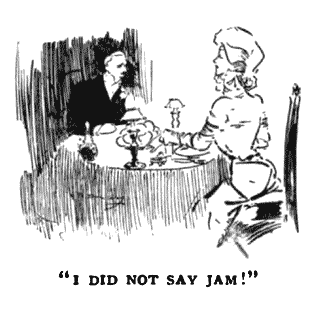 “I said ‘jam’—meaning crowd, concourse, gathering, assemblage, mob. Did you think I was talking about preserves?”
“I said ‘jam’—meaning crowd, concourse, gathering, assemblage, mob. Did you think I was talking about preserves?”
“My dear Arthur,” returns Ethel, “I did not hear exactly what you were saying. My thoughts were with Dorothy. But I understood you to remark that ‘it was gooseberry jam.’ ”
“I said it was ‘a deuce of a jam.’ ” repeats Benton.
“Well, so it is,” agrees Ethel, “and, likewise, so it was. If I had not found that corner of refuge behind the bookcase, I think I should have perished. But it was a great coigne of vantage, and wholly out of range of the spillers.”
“The spillers?” queries Benton.
“Yes, the spillers—the creamed-oyster and punch and coffee spillers,—you know the tribe. There are always two or three at every place one goes. There was a pretty fair representation at Dorothy’s this afternoon, although I did not see anything very serious—nothing worse than two or three dollars’ worth.”
“Well, you’ve lost me!” says Benton.
“Lost you?” repeats Ethel, with a puzzled little frown.
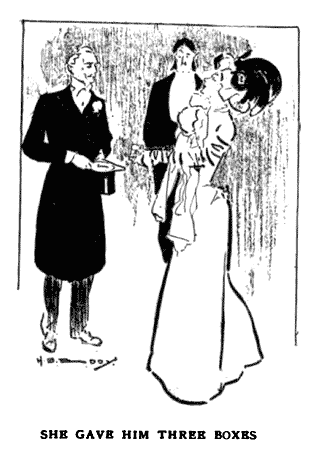 “Yes; I don’t follow your argument,” explains Benton. “What is it that was no worse than two or three dollars’ worth?”
“Yes; I don’t follow your argument,” explains Benton. “What is it that was no worse than two or three dollars’ worth?”
“Oh,” she exclaims, laughing, “I meant that none of the spillers did more than two or three dollars’ worth of damage per spill. Now, under favorable conditions, a full-grown, active spiller can do a hundred dollars’ worth of damage by a mere turn of the hand, or the plate, rather. You take an application of lobster Newburg to a lilac silk skirt, for instance, and you have knocked a big hole in a hundred-dollar bill.”
“I should think the dress-makers would have spillers working for them on commission,” remarks Benton. “It must have been one of your spiller friends whom I saw upset the table with the wedding-cake on in the hall—”
“Oh, the wedding-cake,” cries Ethel. “Did you bring any home?”
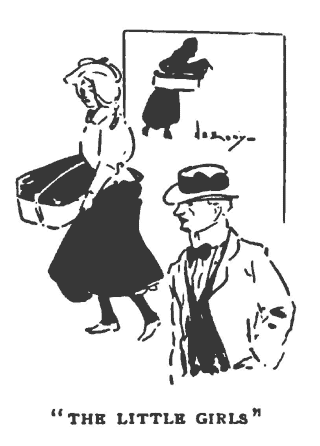 “Yes, of course; you gave me three boxes.”
“Yes, of course; you gave me three boxes.”
“One is for mamma.”
“Did not she get any herself?”
“Oh yes; but she will want another box.”
“What for?”
“I don’t know,” says Ethel, frankly; “but she always does. I think she gives them away.”
“I suppose she gives the stuff to the little girls who bring home those boxes, with patent-leather tops, from the dressmakers?”
“I should not be surprised,” admits Ethel.
“I’ll bet the little girls are; and I’ll bet their little insides are surprised, too, after they swallow that cake-stuff.”
“No doubt it makes them dream of wedding-bells and brides, and all that sort of thing,” advances Ethel, on behalf of her mother’s charity methods.
“I’ll wager it makes them dream of bigamy at the very least,” exclaims Benton. “I know I should see double if I ate any of it. The idea! I think it is almost criminal to give that stuff to any one who is likely to eat it. It’s all well enough,” he continued, “to leave it lying around where only butlers and wedding-guests will take it; but to pass it on to unsophisticated and undyspepsified children is a crime, pure and simple. Why, even rats—”
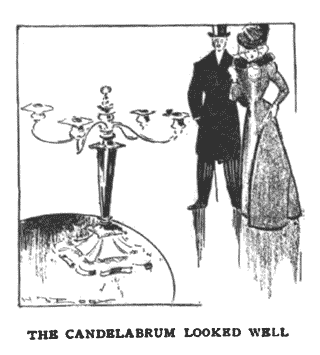 “Arthur, dear,” interrupts Ethel, “please don’t talk about rats at the table. Come back to the subject of the wedding. Tell me what you thought of the presents.”
“Arthur, dear,” interrupts Ethel, “please don’t talk about rats at the table. Come back to the subject of the wedding. Tell me what you thought of the presents.”
“Pretty good lot,” avers Benton. “Considering Leroy is from Philadelphia, they did well.”
“They did not get as many pretty things as we got,” asserts Ethel.
“Oh, of course not. Nobody ever did, or ever will!”
“Well, now, Arthur—they did not!” persists Ethel. “We had much more silver—big pieces—”
“Comparisons are invidious and odious, my dear,” puts in Benton. “I noticed that our candelabrum showed up pretty well.”
“Didn’t it?” exclaims Ethel, joyfully. “I was surprised. It looked much better there than it did in the shop.”
“Yes, it put up quite a good bluff,” says Benton, sententiously. “There was not another among the presents, either. But I heard one overdressed female say she thought it was stupid for any one to give people candlesticks nowadays, when almost all flats are provided with electric lights.”
“Gracious!” exclaims Ethel. “How do you suppose she got in? Perhaps she was a dress-maker, or something?”
“I don’t know. But there was another queer one that seemed to take great interest in the presents. He was there looking at them every time I went in, and I had to take two or three women around. You must have seen him—a regular plug-ugly, with a red mustache and a black cut-away coat?”
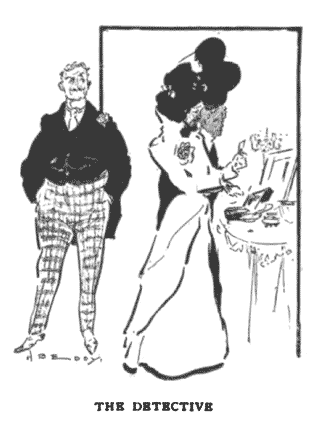 “Why, that was the detective,” explains Ethel, sagely.
“Why, that was the detective,” explains Ethel, sagely.
“The detective?”
“Certainly. People always have a detective in the room with the wedding-presents.”
“Nice idea of hospitality, that,” comments Benton, “to ask your friends in, and then set the police to watch them!”
“You can’t tell who might get into the house,” explains Ethel. “Thieves are always watching for a chance.”
“I suppose, too,” adds Benton, “there is always the possibility of somebody’s getting the remorse, and trying to take his present back again. That would be easy enough for the bonbon-spoon and sugar-tongs class of givers, but rather difficult, I should imagine, for any one of the cut-glass-punch-bowl or candelabrum class, like us. I should think,” he pursues, reflectively, after a pause, “it would be simpler to have a man at the front door to search each guest as he goes out. Did we have cops?”
“No,” answers Ethel; “the presents were not shown on the day of our wedding. Don’t you remember?”
“I had forgotten it,” says Benton, solemnly. “It must have broken your mother’s heart. She must have imagined people would think we did not get any.”
“Oh, she sent out cards after we left,” protests Ethel, “and showed our presents to her intimates and to the gossips for three days afterwards.”
“I think the non-combatants and camp-followers get more fun out of a wedding than the principals, every time,” asserts Benton. “But that’s one of those things you don’t realize until you’ve been through it. Women especially always have a good time at other women’s weddings. I suppose that is what makes them such inveterate match-makers.”
“How you do love to hear yourself talk, Arthur!” says Ethel; “especially about things of which you know nothing. I am glad there is no one here to-night to listen to you express your opinions about matrimony—”
“I have not mentioned matrimony,” exclaims Benton.
“Men always think it is funny to ridicule serious and sacred things,” continues Ethel, dogmatically; “especially things concerning women—”
“Are you a serious or a sacred thing?” interrupts Benton, solemnly.
“I am very serious just now; and when you sit up and ridicule your wedding-day—”
“I did nothing of the sort,” ejaculates Benton.
“Well, it sounded very much like it,” persists Ethel, with a deeply injured expression.
“Why,” returns the crafty Benton, cheerfully, “the only reason I like to go to other people’s weddings is because they remind me so vividly of my own.”
“That’s a very good way to get out of it,” returns Ethel; “and if that is really the view you take of the matter, you may go with me to the Burton wedding next week, and to Peggie Turner’s wedding at Montclair on the 10th.”
And Benton, who is quick to recognize the pitfall he has dug for himself, and which Ethel has seen and availed herself of, agrees as cheerfully as he can to the proposed ordeals, devoutly hoping meanwhile that something will occur to rescue him from his obligations.
“I MET Mrs. Jenkyns while I was out this morning,” remarks Ethel Benton to her husband, towards the end of dinner on a warm evening late in June.
“Don’t know her,” returns Benton, laconically, fanning himself with a napkin.
“Why, of course you do!” continues Ethel. “She was Ida Richards, at school with me; you have met her; married four years ago. I sent her a glass bowl; she sent us oyster-forks. Don’t you remember?”
“Oh yes; that little stout woman,” agrees Benton, somewhat absent-mindedly.
“Well,” proceeds Ethel, “she was very effusive, and she told me they had taken a cottage at Seabright for the summer, and she said we must come and visit them.”
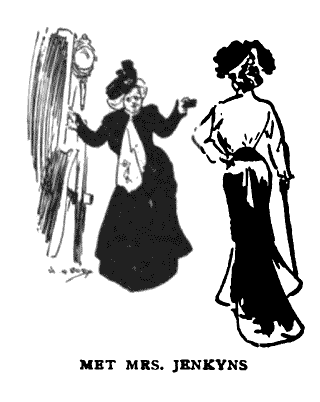 “Oh, I know that kind!” says Benton.
“Oh, I know that kind!” says Benton.
“That kind of what?” Ethel asks.
“That kind of invitation,” he explains. “I’ll warrant Mrs. Jenkyns says that same thing to every person she meets. Of course I may be doing Mrs. Jenkyns a gross injustice, having had the pleasure of meeting her once only—and that at a tea riot—but I feel sure that she belongs to the ‘Hello-old-chap-come-and-lunch-with-me-any-day!’ class. Those bids are very effective at the time, and inexpensive. But I am ‘on to the gag,’ as Freddy says.”
“You mean that she does not really intend to ask us down?” inquires Ethel.
“Perhaps not exactly that,” returns Benton. “I dare say the good woman was sincere enough at the time she was speaking to you; but there are many people who say things on the spur of the moment, and later find it inconvenient or inexpedient to make good their offers. The only thing to do is to take such an invitation on the wing for what it is worth. My estimate of its value is to place no confidence in its fulfilment. If she does write, later on, fixing a date for our visit, I shall be surprised. If she does not, I shall not feel in any way slighted.”
“You think, then,” says Ethel, “that Mrs. Jenkyns goes about scattering verbal invitations to friends and acquaintances promiscuously, without any intention of having them come to her?”
“If these verbal invitations carry no date with them—yes,” asserts Benton. “But that sort of thing is only an evidence of a mild and harmless form of hysteria, after all. Hundreds of people do the same thing. They say, ‘You must come to dinner with us soon,’ as glibly and as innocently as they would say, ‘I hope you will call soon.’ They don’t mean anything by it.”
“But you don’t ask people to dinner with no intention of having them come, do you?” Ethel argues.
“Certainly not,” says Benton; “but I am not hysterical—at least, I don’t think I am. And, besides, I told you I set great faith in dates; I believe in the virility of slang—I believe, when ‘making a date,’ to make a date. Your friend Mrs. Jenkyns believes in making engagements without making ‘dates.’ That is ‘eminently proper.’ ”
“I think you do her a great injustice,” affirms Ethel, who places confidence in all things and in all people; “but, to be perfectly frank, I shall be just as well satisfied if she does not fix any date. I don’t think we would have much fun at their house. Mr. Jenkyns is an old thing.”
“That doubtless describes him perfectly—to the feminine mind,” remarks Benton, soberly. “But if you were talking, say, to an Englishman, who naturally would understand only the simplest and most direct phraseology, how would you express the equivalent of ‘old thing’?”
“Well, Mr. Englishman,” retorts Ethel, haughtily, “I should say that Mr. Jenkyns was fussy and exacting and over particular in small matters—”
“He would object to the dropping of cigar ashes on the rug, for instance,” suggests Benton.
“Exactly,” agrees Ethel. “He is one of those men who always insist on getting into the theatre fifteen minutes before the curtain rises; and he nearly has a fit if he can’t find his rubbers on a rainy day.”
“Well, you must be an ‘old thing,’ then,” ventures Benton, “because you nearly have a fit if you can’t find my rubbers when there is a little dew on the sidewalk.”
“Of course,” sniffs Ethel, “your wife is everything unpleasant and disagreeable. I really can’t see why you ever got married—”
“Heard that before!” shouts Benton, raising his hands; “and as I admit it to be an unanswerable argument, I plead extenuating circumstances, and will pacify you for the present by telling you that I have had better luck than you to-day, for I have actually ‘made a date’—that is, if you ratify the agreement.”
“What kind of a date?” asks Ethel, enthusiastically.
“To go down to Lobster Point for over the Fourth.”
“To Dorothy’s?”
“Exactly,” replies Benton. “Leroy called me up on the telephone to discuss the question to-day. We are to be their first guests. The house is hardly settled yet, and we may have to sleep on the floor.”
“Oh, I don’t care about that!” exclaims Ethel, enthusiastically; “but won’t it be fun seeing them have all the troubles we had when we were chicks? Carpets and curtains and linen, and all that sort of thing!”
“A cheerful way you women have of looking at one another’s trials,” comments; Benton.
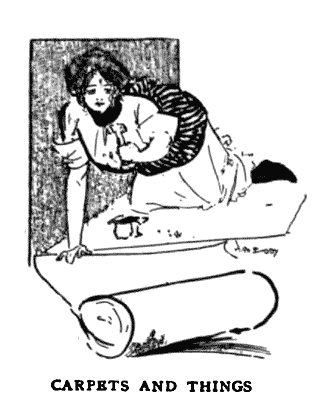 “Oh, you know what I mean,” says Ethel, with a little nod of impatience. “It will be so much fun helping them out—telling them the prices of things—”
“Oh, you know what I mean,” says Ethel, with a little nod of impatience. “It will be so much fun helping them out—telling them the prices of things—”
“And how much they got stuck,” interrupts Benton, “and where they can get the same thing for half the price! Oh yes, I know! We’ve been there!” and he laughs the laugh of appreciation.
“I’m going to write to Dorothy tonight,” continues Ethel, “and tell her we’ll come; and I shall ask her to call for me the next time she comes to town on a shopping expedition. What is their address at Lobster Point? What is the name of their place? Dorothy said she wanted to call it by some romantic name, like ‘The Rocks,’ or ‘Tide Wave,’ or ‘Cozy Hollow,’ or something like that.”
“I remember she did,” says Benton, chuckling. “I asked Leroy what the place was called. He has named it, ‘At the Sign of the Lobster,’ and has ordered an emblematical flag to hoist over the boat-house.”
“Arthur!” cries Ethel, “he has not done anything of the kind!”
“He has, I assure you,” affirms Benton. “The name of their village is Lobster Point—Leroy could not help that, of course. And Dorothy has made out such a long list of people that are to be asked down during the summer that Leroy says his house will be a regular summer hotel, or an inn; and so he calls it, ‘At the Sign of the Lobster,’ in respect to local tradition, I suppose.”
“Well, Dorothy won’t have that,” asserts Ethel, confidently.
“Of course she will!” continues Benton. “She ought to be delighted. Just think how easy it will be to mark the linen with red indelible ink and a little stencil of a lobster! And what an odd and artistic device for her note-paper—‘a lobster, gules, rampant, on a field, azure, semée with soft-shell crabs, argent!’ ”
“You and Mr. Leroy must have lunched together,” remarks Ethel, calmly.
“We did,” admits Benton.

“And I am convinced you suggested that lobster idea to Mr. Leroy, and all that about the foolish flag—”
 “Well, as to the flag,” begins Benton, “I accept a certain amount of responsibility. As a matter of fact, I wanted a deviled lobster on it, because I thought the scheme would lend itself readily to heraldic expression, involving a lobster with horns, like a devil, gules, rampant, sinister, and all that. But Leroy was just for a plain live lobster of the sea. I pointed out to him that the ordinary crustacean of commerce, being of a mottled green, could not very well be picturesquely and effectively treated on the white field of the flag, and so he compromised in favor of a boiled lobster. So we matched to see whether it should be a boiled lobster or a deviled lobster, and Leroy won. Then we matched to see who should pay for the flag, and I stuck Leroy. And we are going to have a grand patriotic flag-raising at Lobster Point on the morning of the Fourth of July—”
“Well, as to the flag,” begins Benton, “I accept a certain amount of responsibility. As a matter of fact, I wanted a deviled lobster on it, because I thought the scheme would lend itself readily to heraldic expression, involving a lobster with horns, like a devil, gules, rampant, sinister, and all that. But Leroy was just for a plain live lobster of the sea. I pointed out to him that the ordinary crustacean of commerce, being of a mottled green, could not very well be picturesquely and effectively treated on the white field of the flag, and so he compromised in favor of a boiled lobster. So we matched to see whether it should be a boiled lobster or a deviled lobster, and Leroy won. Then we matched to see who should pay for the flag, and I stuck Leroy. And we are going to have a grand patriotic flag-raising at Lobster Point on the morning of the Fourth of July—”
“You two are crazy!” exclaims Ethel, pushing her chair back from the table.
“Not a bit,” resumes Benton, with great seriousness of countenance. “There will be much allegorical and historical meaning in that little ceremony. Don’t you remember, my dear, that the boys of ‘76 called the British soldiers lobsters—I mean lobster-backs—on Boston Common?”
“I don’t want to hear any more of your nonsense,” cries Ethel, nervously, as she rises from the table and flees to the sitting-room. “You may smoke there alone; I am going to write to Dorothy.”
“Well, don’t tell her about the flag,” says Benton, as he resumes the rhythmical fanning with his napkin, and his cigar glows in the darkening room.
As June fades away, and the Fourth cracks and sputters itself noisily into the past, and the warm days come thicker and faster and hotter, the ever-recurring summer question begins to worry the Bentons, just as it worries almost everybody else who has no fixture out of town. The Bentons have put off wrestling with the problem as long as they can, hoping, perhaps, that something might happen to solve it for them; but as nothing has happened, and as the thermometer keeps rising, the day has finally come when the question has to be faced and settled.
“Of course,” begins Benton, “there are any number of things we might do if we could, there are some things we could do if we would, there are many things we would not do if we could, and some that no power on the face of the earth could compel us to do.”
“That sounds like a paragraph from the President’s message,” remarks Ethel. “If you will only follow it up with a few statistics and a recommendation, your effort would be perfect. But I don’t believe you have a single thing to suggest.”
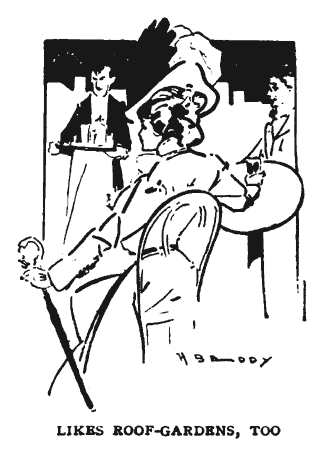 “I should suggest New York,” promptly replies Benton.
“I should suggest New York,” promptly replies Benton.
“You would suggest New York for what, my dear?”
“New York as the ideal summer resort.”
“Men seem to think so,” says Ethel, dryly.
“Men are very astute,” returns Benton, solemnly; “and, besides, most of them spend enough of the summer in town to be good judges of the city’s advantages.”
“Well, after all,” concedes Ethel, “I don’t know but that I agree with you. I enjoy the roof-gardens myself.”
“So do I, of course, to a certain extent,” admits Benton. “But what I enjoy most is the liberty and freedom of my own house, which is a hot-weather luxury one cannot get in a summer hotel or on a visit.”
“Very true, my dear; but there are some luxuries you must forego. The question to decide is what particular luxury you most desire.”
“I should greatly appreciate the luxury of a complete and extended rest.”
“A month of Sundays?” suggests Ethel.
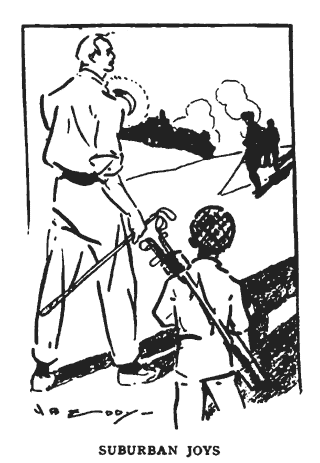 “A month of summer Sundays?” exclaims Benton, inquiringly. “I should say not! Those are the hardest days of the year. This business of going out of town ‘for over Sunday’ is a delusion, so far as rest is concerned. Your host meets you at the station on Saturday, and hustles you to his house and up to your room—usually a hot room; he shouts at you up the stairway to jump into your golf clothes—which is a pleasant way of cooling off; he takes you over to the club and makes you walk a thousand miles around a torrid eighteen-hole course; he gets you back barely in time to dress for dinner; he chases you off to some kind of a racket after dinner; he gets you to bed late; he bounces you up early Sunday morning; he does stunts with you all day Sunday—according to his convictions; and on Monday morning you are routed out some two hours earlier than it is your custom to rise; you gulp down a cup of coffee, watch in hand, and sitting on your satchel, wondering how many personal things you have left up-stairs unpacked. And, meanwhile, your heavy eyed hostess says to her nervous spouse: ‘George, dear, don’t hurry; you might just as well wait for the next train. The 8.3 will get you to town almost as soon as the 7.48.’ Oh yes, summer Sundays are restful!” And Benton leans back in his chair and fans himself resignedly with his napkin.
“A month of summer Sundays?” exclaims Benton, inquiringly. “I should say not! Those are the hardest days of the year. This business of going out of town ‘for over Sunday’ is a delusion, so far as rest is concerned. Your host meets you at the station on Saturday, and hustles you to his house and up to your room—usually a hot room; he shouts at you up the stairway to jump into your golf clothes—which is a pleasant way of cooling off; he takes you over to the club and makes you walk a thousand miles around a torrid eighteen-hole course; he gets you back barely in time to dress for dinner; he chases you off to some kind of a racket after dinner; he gets you to bed late; he bounces you up early Sunday morning; he does stunts with you all day Sunday—according to his convictions; and on Monday morning you are routed out some two hours earlier than it is your custom to rise; you gulp down a cup of coffee, watch in hand, and sitting on your satchel, wondering how many personal things you have left up-stairs unpacked. And, meanwhile, your heavy eyed hostess says to her nervous spouse: ‘George, dear, don’t hurry; you might just as well wait for the next train. The 8.3 will get you to town almost as soon as the 7.48.’ Oh yes, summer Sundays are restful!” And Benton leans back in his chair and fans himself resignedly with his napkin.
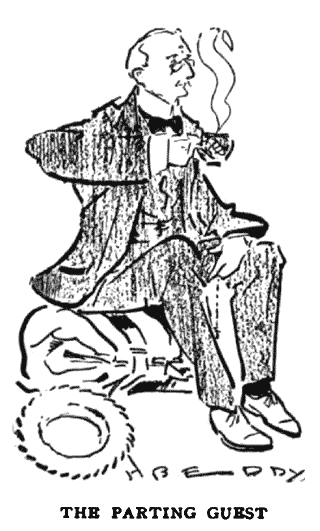 “But just think of doing that every day, Arthur,” comments Ethel.
“But just think of doing that every day, Arthur,” comments Ethel.
“Of doing what?”
“Catching the 7.48.”
“Not for a million dollars,” cries Benton. “Until I can arrange matters so that I shall not be compelled to sleep on an alarm-clock, I will forego the luxury of a summer home.”
“Well, I agree with you, because I know you would be dreadfully cross and disagreeable if you had to be catching trains or boats every day.”
“But when I do have my little coop in the country,” continues Benton, reflectively, “I am going to have a lot of people over Sundays and work them to death. I’ll put them on bicycles, and chase them around golf-links, and make them dance all night; and on Monday mornings I’ll have them bounced up at daylight and carted to the train and shunted into New York, while I lie easily in bed thanking the calendar that it is Monday.”
“You seem to have an exquisite conception of the character of host,” says Ethel.
“I’ve been guest, or victim, often enough to know,” returns Benton. “I’ve had the ‘Monday ache’ too many times.”
“But I should think you would go in for reforming the ‘over-Sunday’ evil, rather than for developing it and increasing that dreadful summer ailment which you characterize as the ‘Monday-ache.’ ”
“Well, perhaps when I get my château I will turn philanthropist and establish a rest cure, and settle in a district where no train leaves for the city earlier than 10 A.M., where no one talks golf, where people don’t want to do things all the time, and where time is only a conventional term for the guidance of the butler and the cook.”
As Ethel opens her lips to reply the door-bell rings vigorously, and Benton, looking up in mild surprise, exclaims:
“What do you suppose that is? Somebody in a hurry, evidently. It can’t be anyone to call—it is not yet eight o’clock. Do you suppose it’s a bill?”
A man’s voice is heard when the door is opened, and presently, without further ceremony 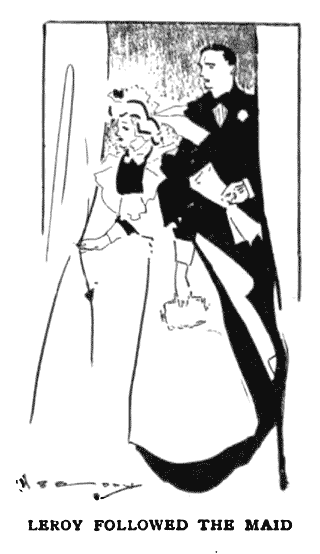 or delay, Leroy stalks into the dining room on the heels of the maid.
or delay, Leroy stalks into the dining room on the heels of the maid.
“Heavens!” exclaims Benton, rising. “Have you lost your cook, Leroy? Come in to beg a square meal? Or did you miss the last train down? Dorothy’s probably having a fit. The joys of country life—”
“That will do, old chap,” interrupts Leroy, who has been shaking hands with Ethel regardless of Benton’s flow of chaff. “Just sit down and finish your dinner—no, thanks, I won’t take any salad—and listen to what I have to say, for I have not much time.”
Benton nods, and Leroy draws his chair to the table and leans forward eagerly.
“Have you made your plans for the summer?” he asks.
“No.”
“Good. I want you to take my house.”
“What!” exclaims Benton. “Take your house? Why, you’ve only just moved in!”
“I know,” begins Leroy; “but—”
“Is it as bad as that?” asks Benton. “And you want me to monkey with the suburban buzz-saw—”
“You idiot,” breaks in Leroy, “wait till I tell you! This is easy for you. There are twenty-eight trains a day each way. You can come in and out at any time. You know the place—Lobster Point; fine air, golf-grounds only half a mile from the house—”
“Oh, cut it short, Leroy,” shouts Benton, impatiently. “You know my sentiments—”
“But I’m going abroad, and somebody’s got to take care of the house,” cries Leroy.
“You are going abroad?” asks Ethel.
“Yes,” continues Leroy, more calmly. “It’s this way: My firm has a bond deal to put through in London; they have suddenly developed a deep confidence in me, and are sending me over to assist one of the partners. They told me of it yesterday, and we have to sail a week from to-morrow. I’m going to take Dorothy along, and she suggested that it would be much better, instead of closing the house, to have you and Benton come down to look after it for the month or six weeks that we shall be away.”
“Oh!” gasps Ethel.
“I won’t pay you any salary as caretaker, Benton,” resumes Leroy, “but you will find the cellar and the pantry well stocked, and you may run the ‘Sign of the Lobster’ to suit yourself.”
“You mean,” says Benton, slowly, “that you present me with your manorial domain for the period of your absence?”
“I do; I even implore you to save me the worry of having to think of some other arrangement. I’ll even give you my commutation ticket—”
“Stop!” shouts Benton. “That’s the one objection to the plan.”
“Well, pay your own fare, then,” laughs Leroy; “but tell me if you will look after the place. What is your answer?”
“What is it, Ethel?” asks Benton.
“It is yes, of course,” cries Ethel. “Mr. Leroy, you are the angel that has solved the deadly summer question for the Benton family.”
“All right,” he replies, rising. “I’ll tell Dorothy, and she’ll be in town to see you to-morrow morning. Goodbye!” and before Benton can get around the table Leroy has rushed out, and in a second the front door slams behind him.
“That’s the commuter habit,” says Benton, dropping into a chair, and the two stare at each other in silence for some minutes.
“Is not it glorious?” whispers Ethel, at length.
“I don’t know,” returns Benton, softly. “Where is that time-table Leroy gave me the other day?” and he walks slowly into the front room to look into his future.
And so it happens that the next week the Benton family, with a wagon-load of trunks and boxes, desert the town and pass out of it quietly, as they now pass out of this story. And although there is no way of proving it, it is much to be feared that Benton becomes a commuter.
THE END
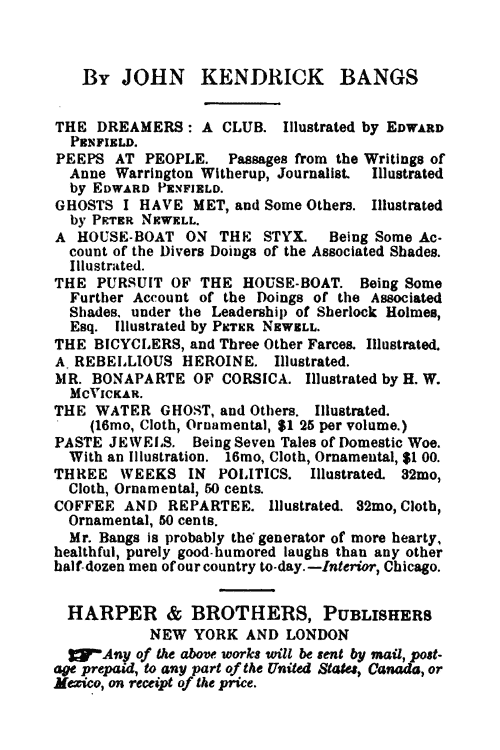
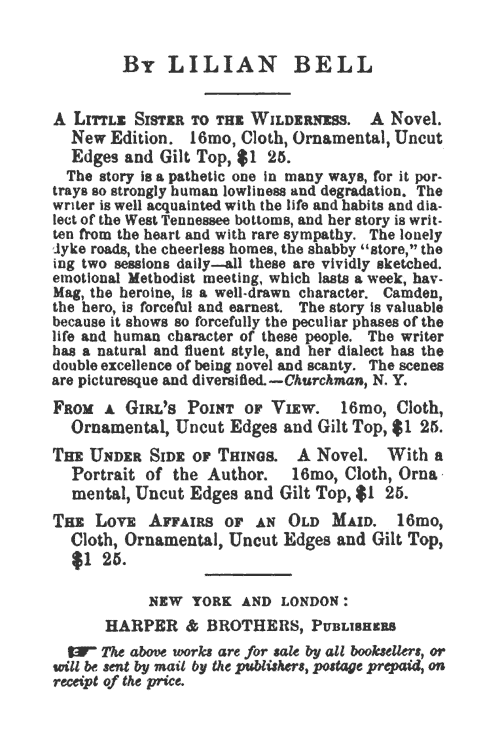

This site is full of FREE ebooks - Project Gutenberg Australia